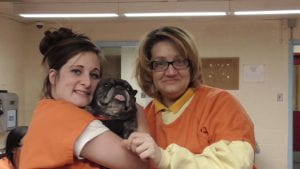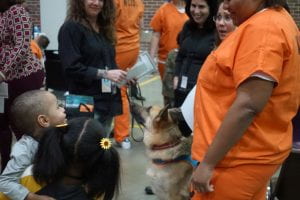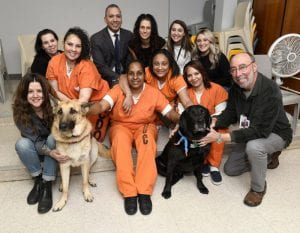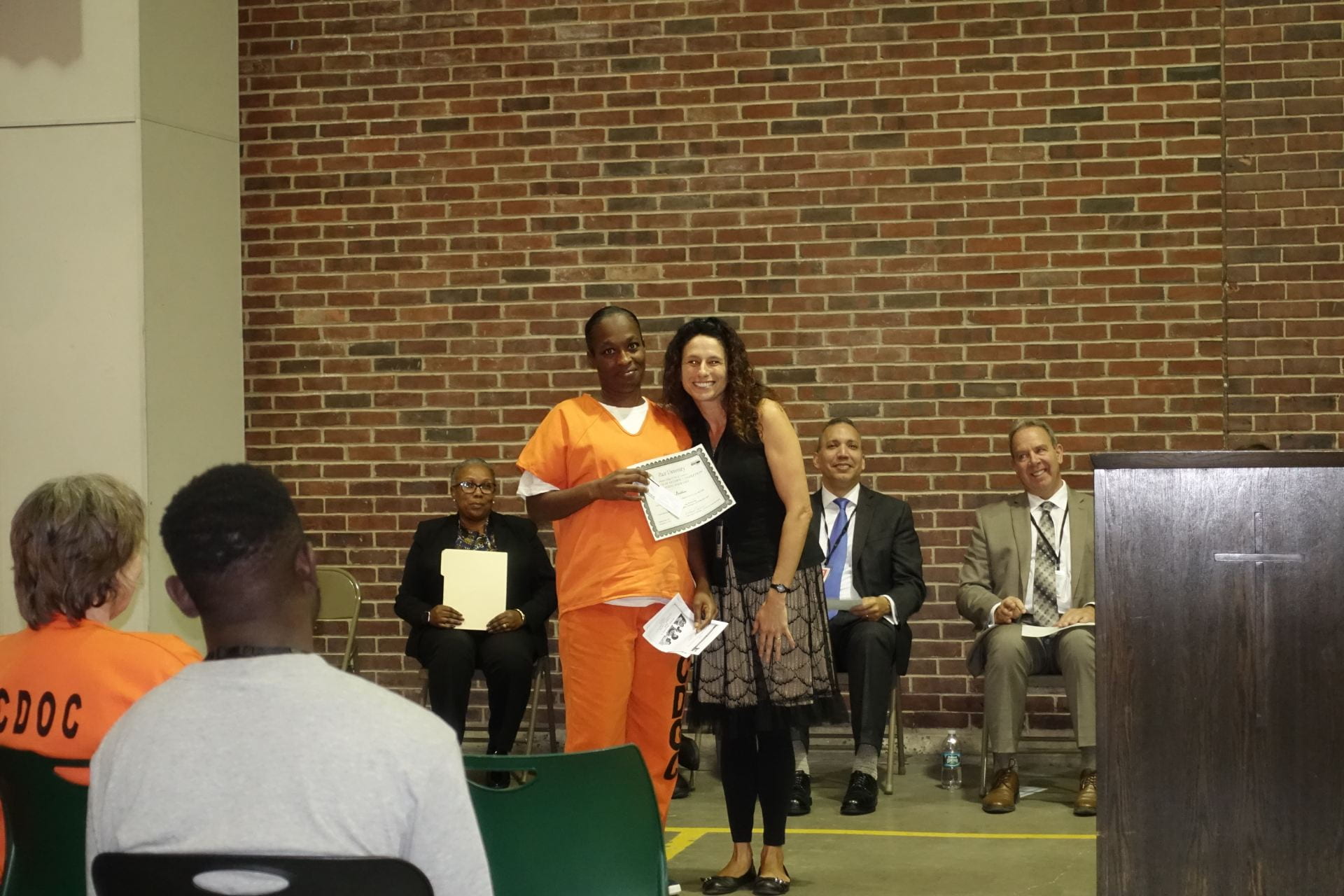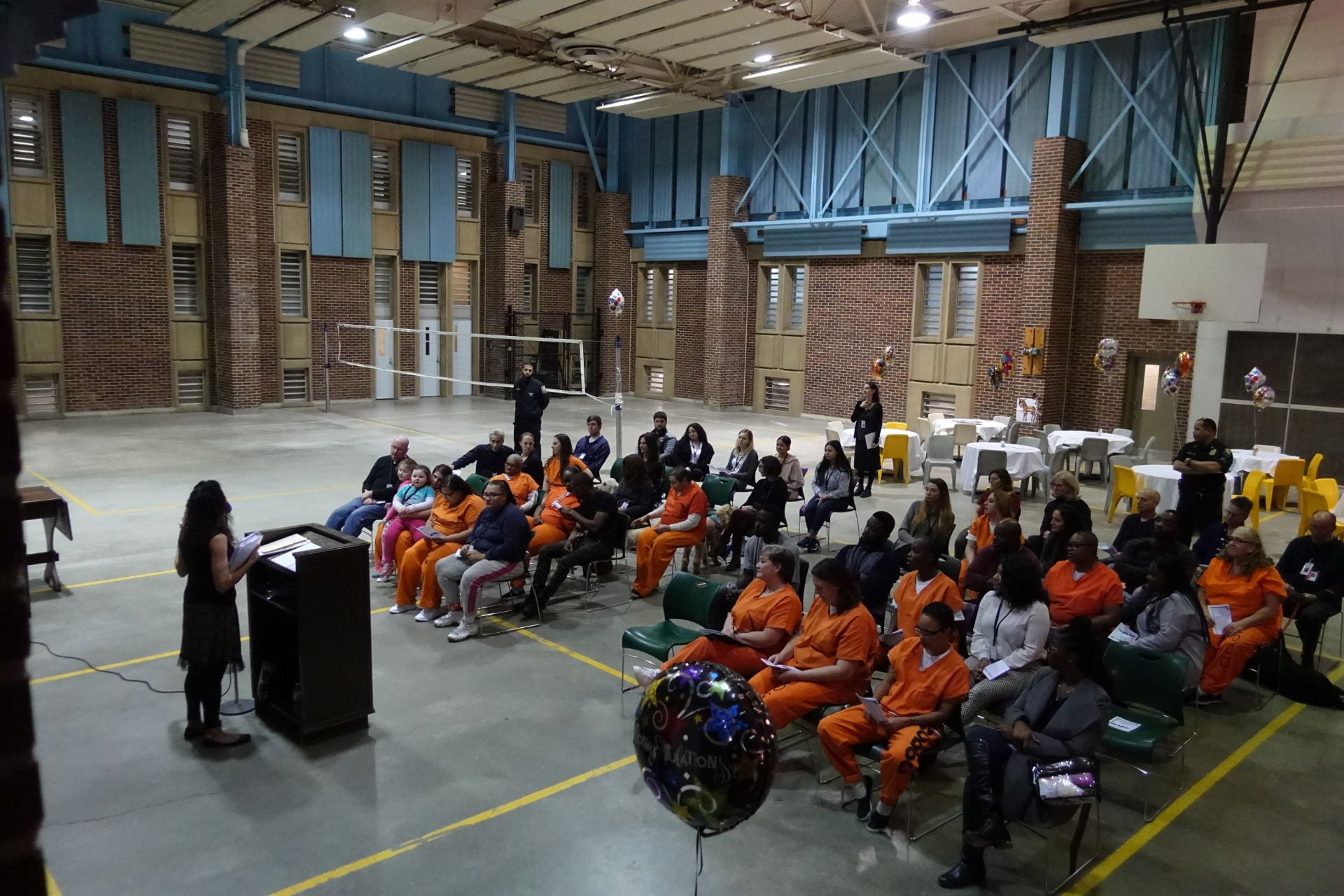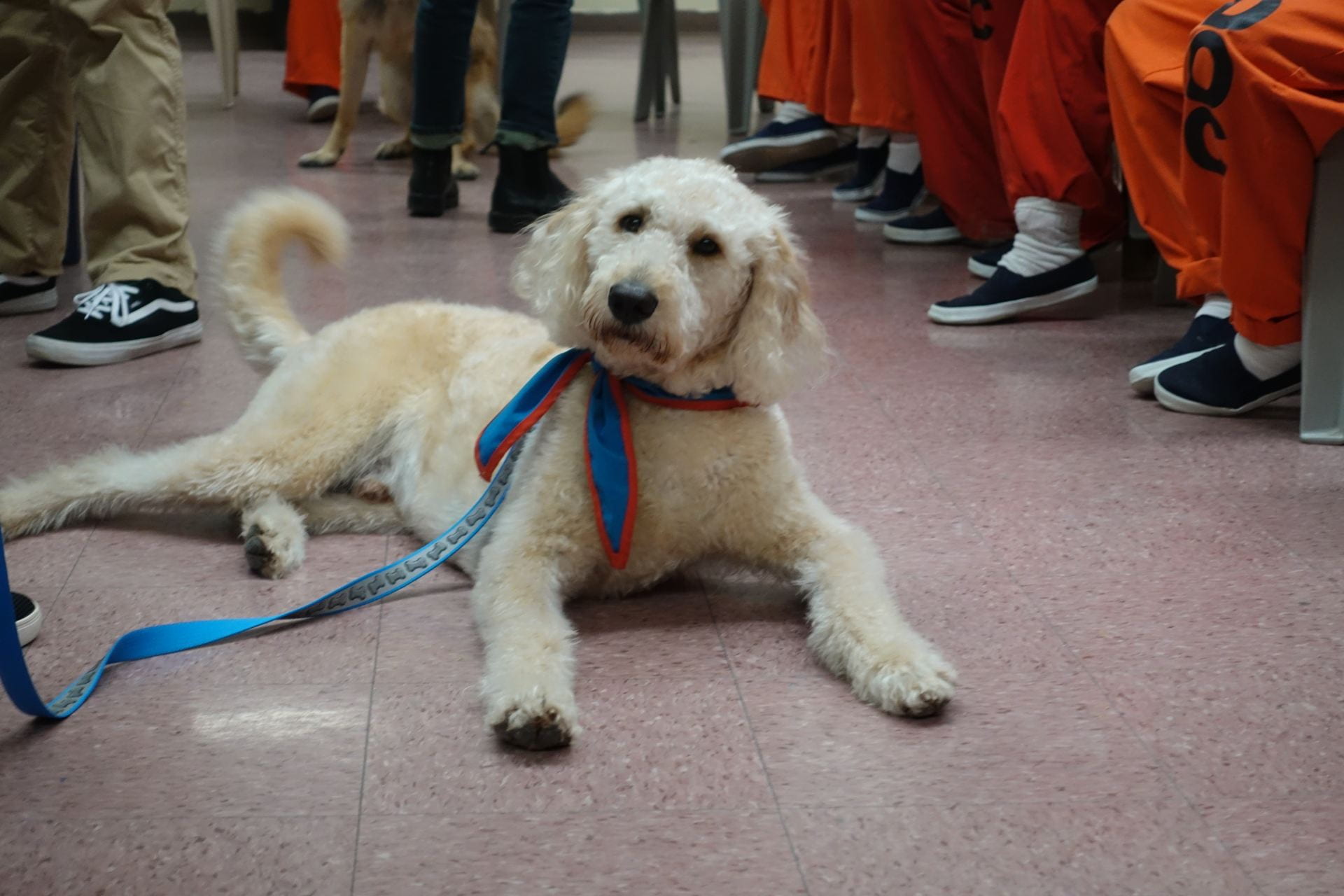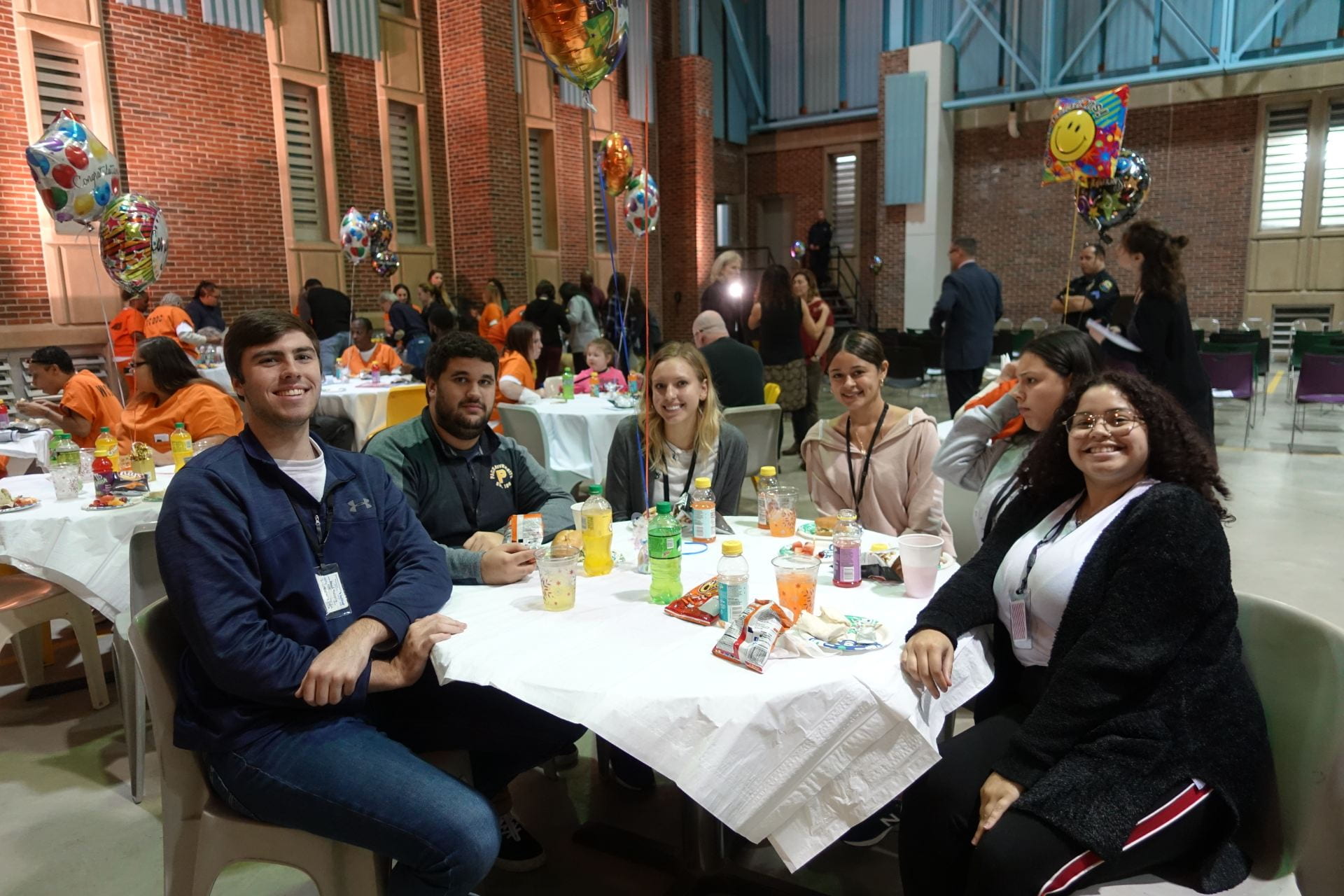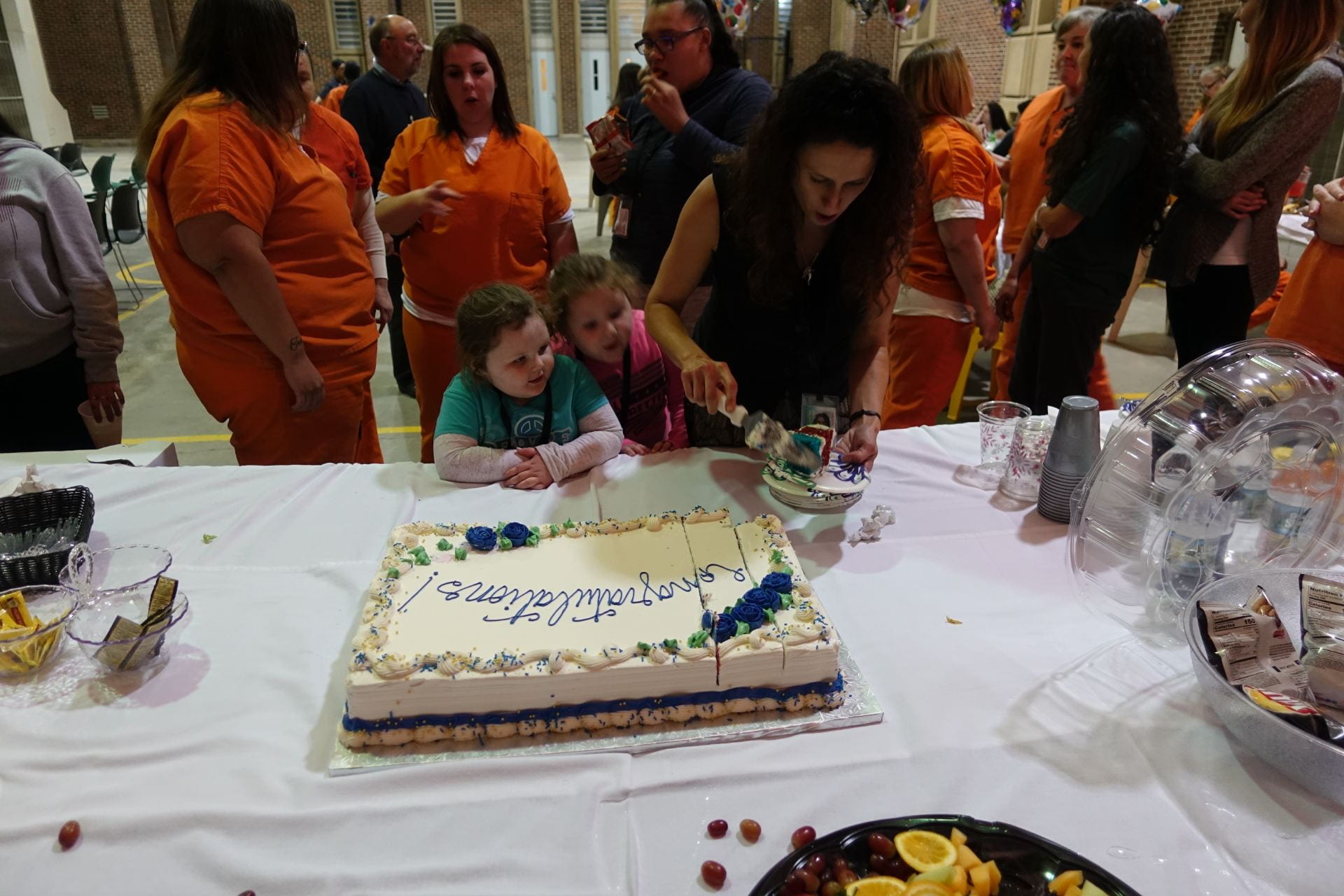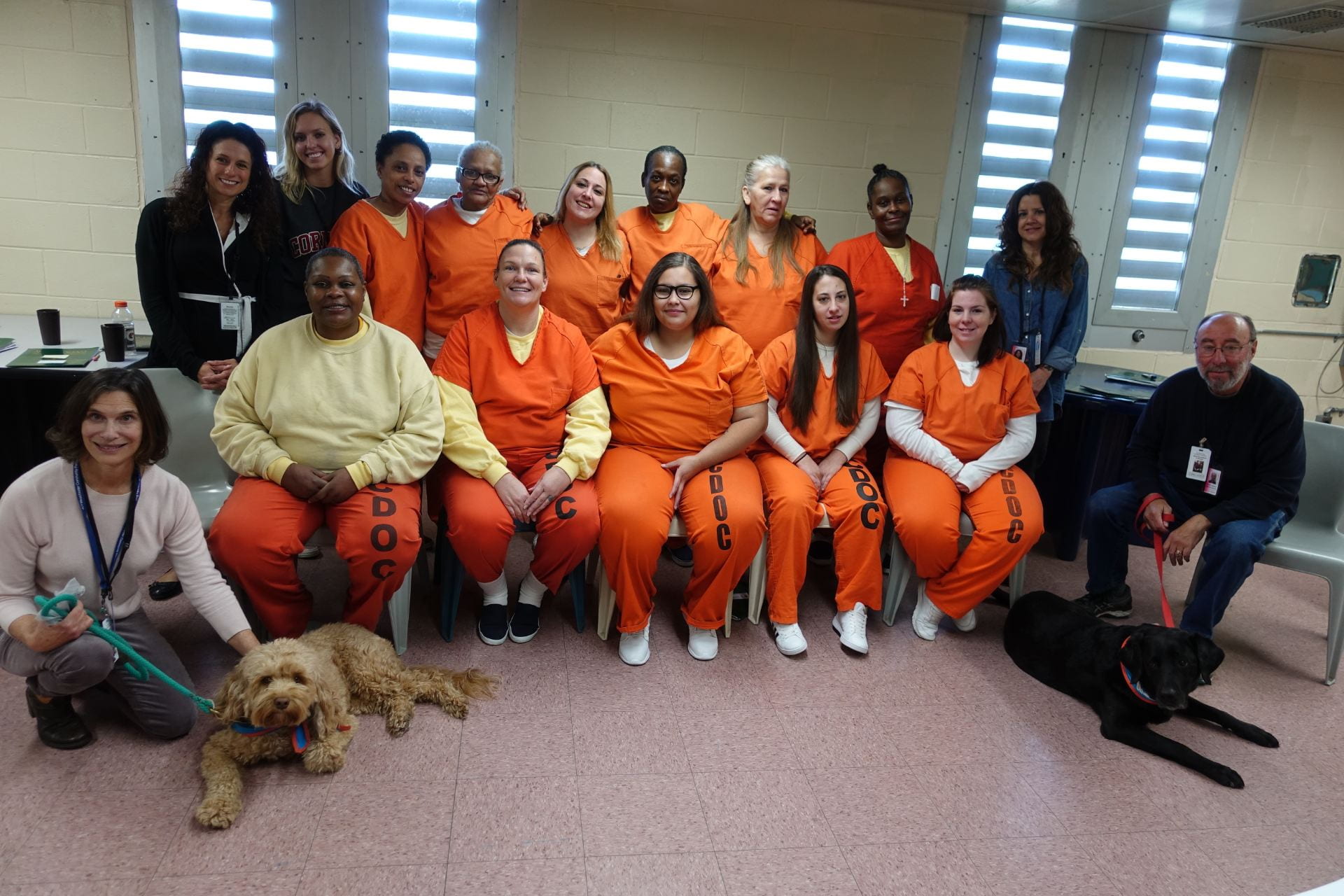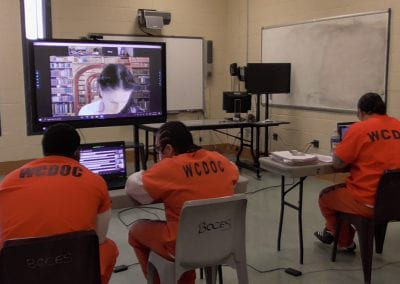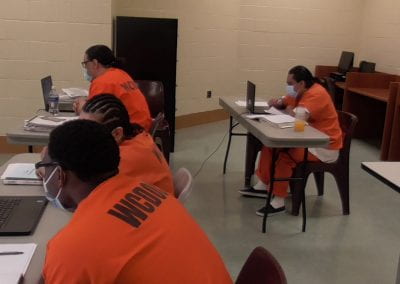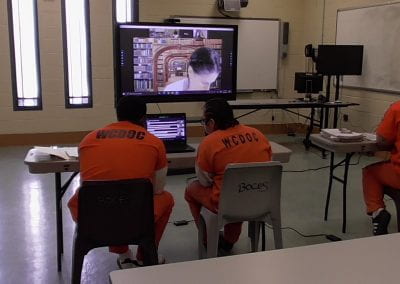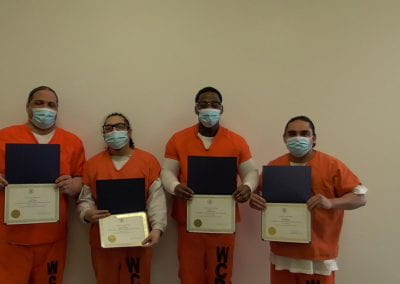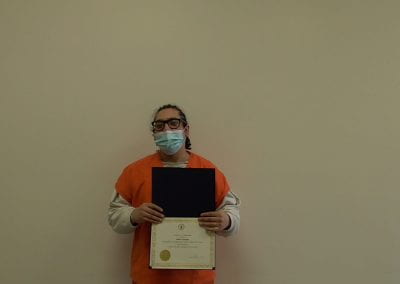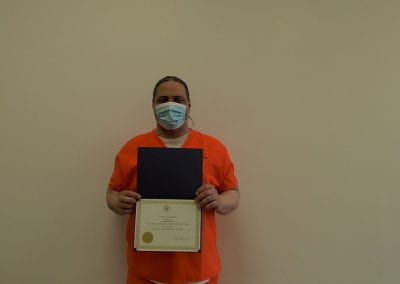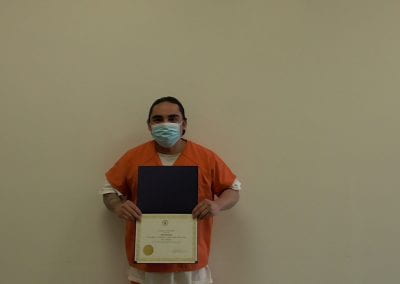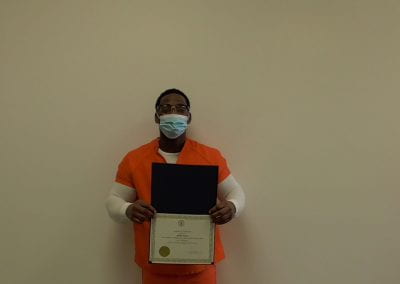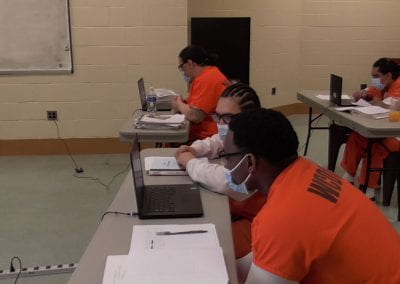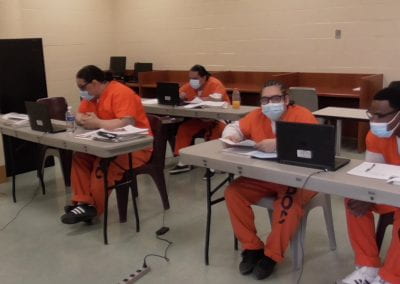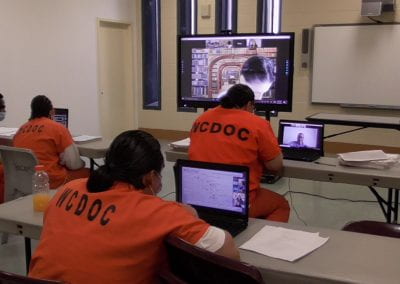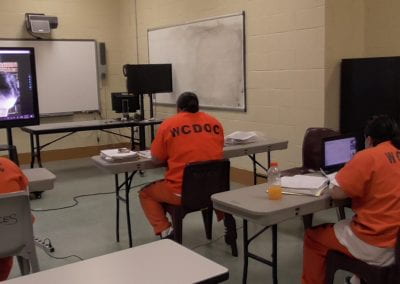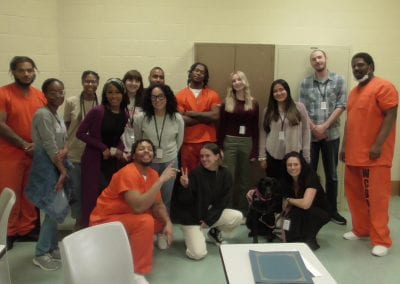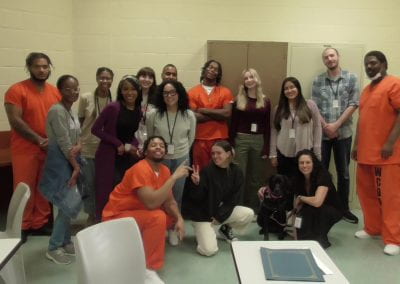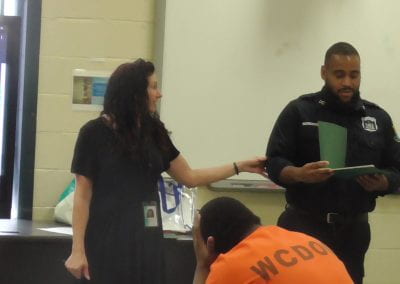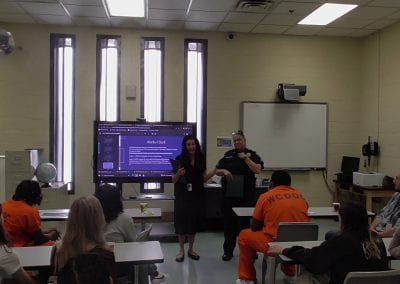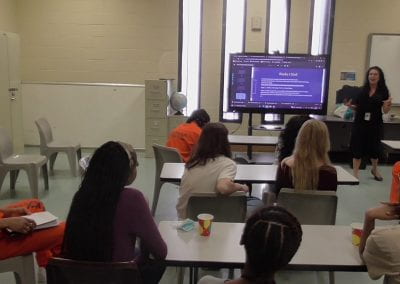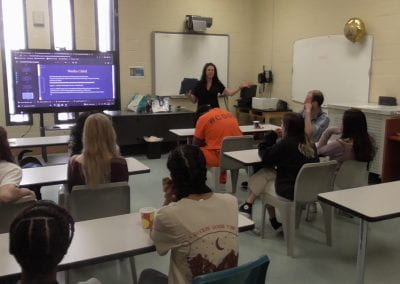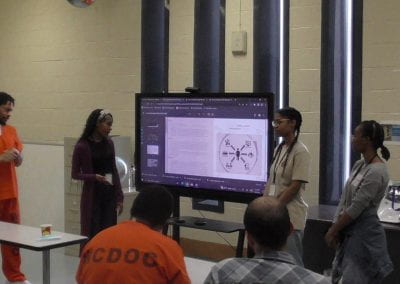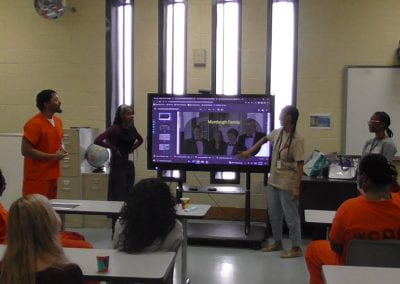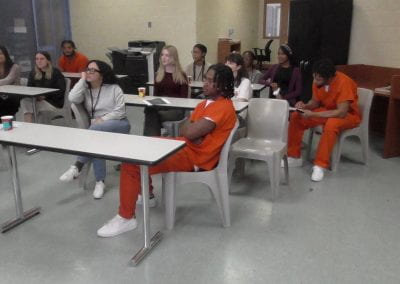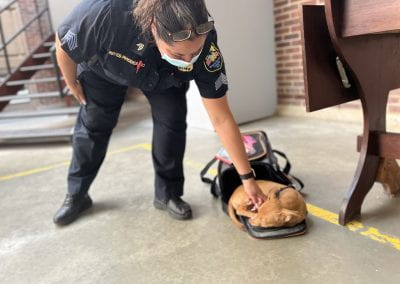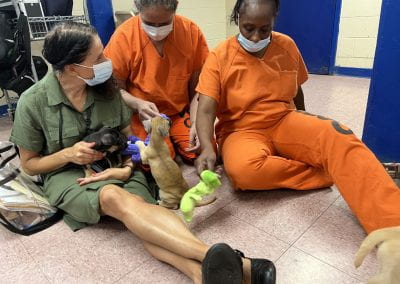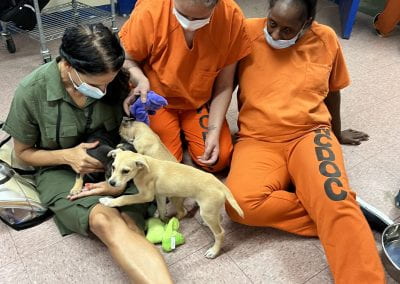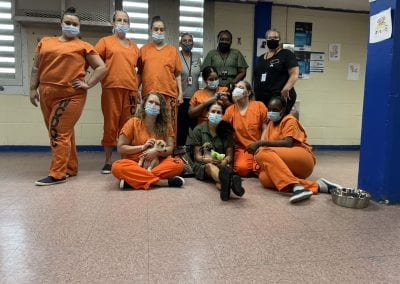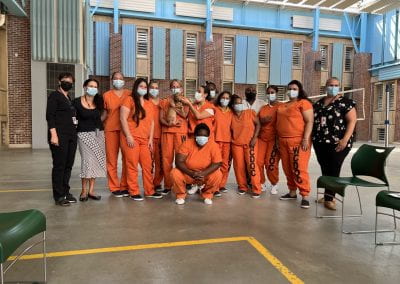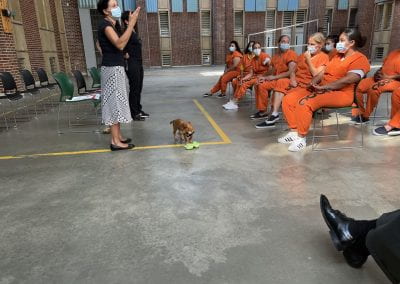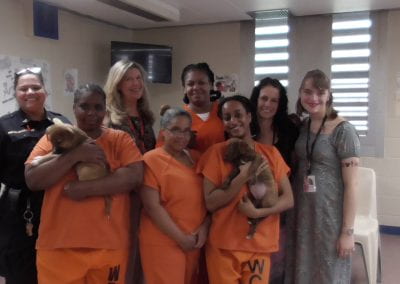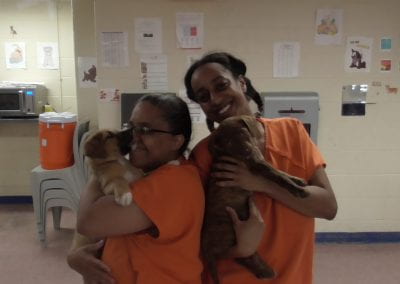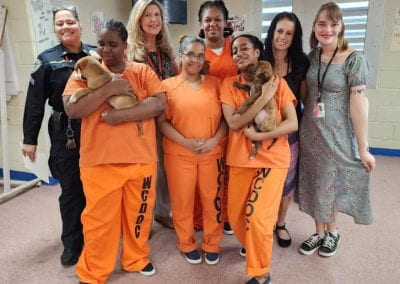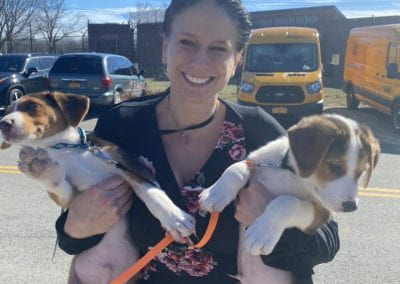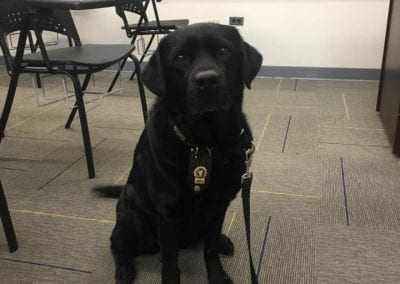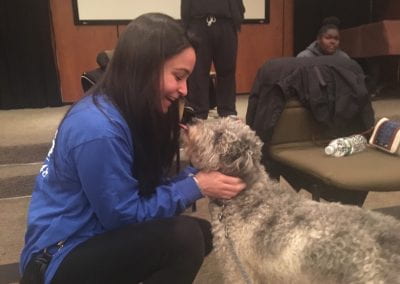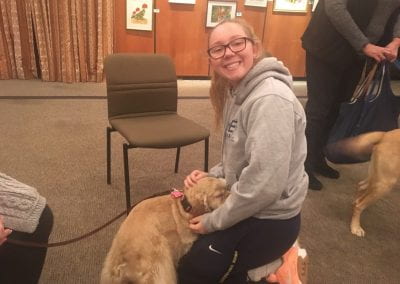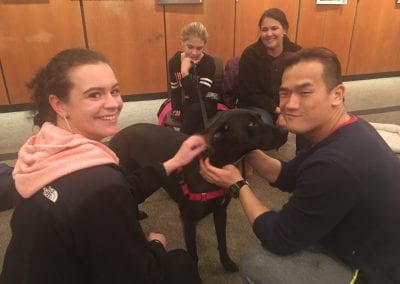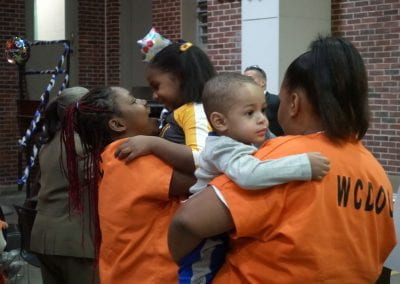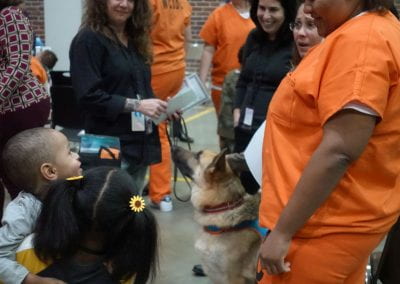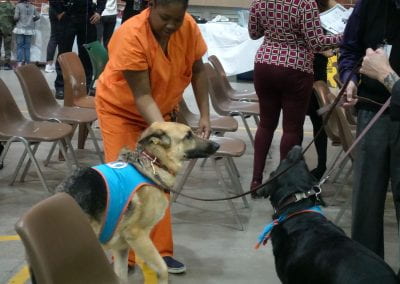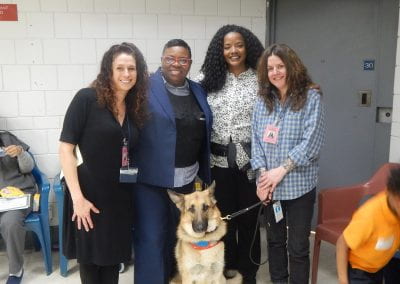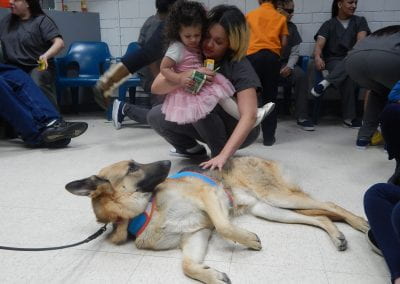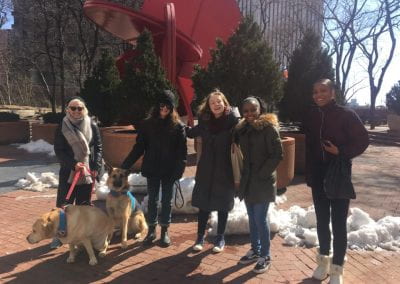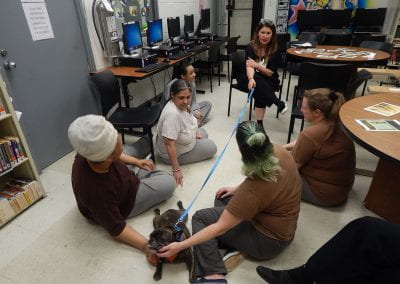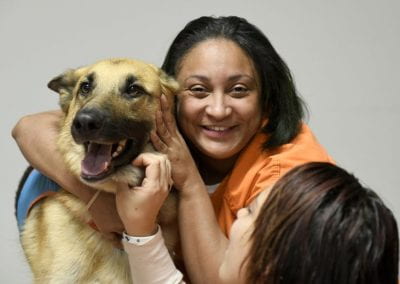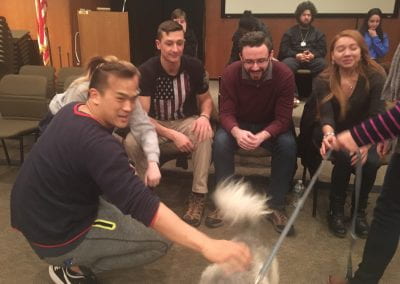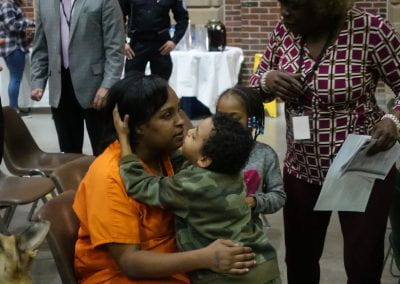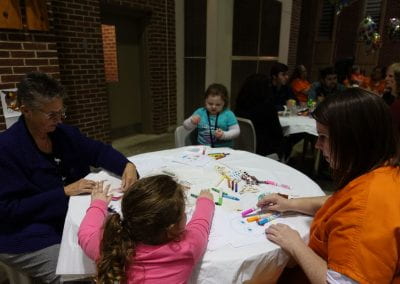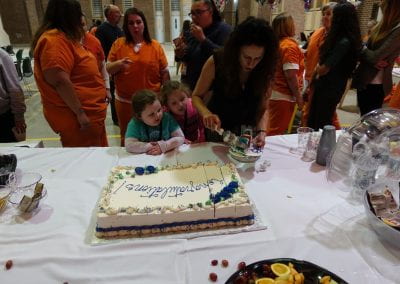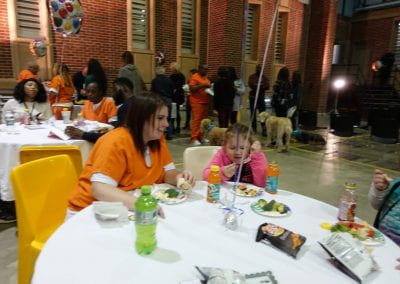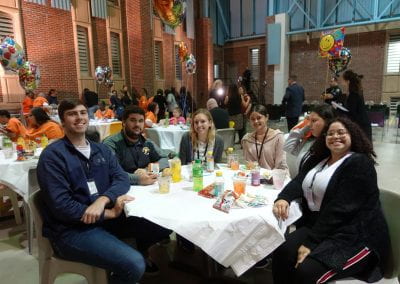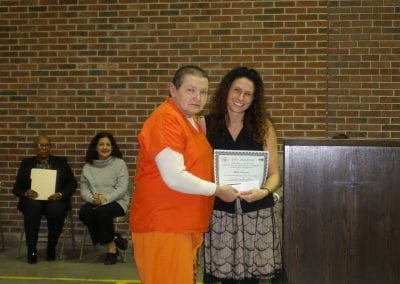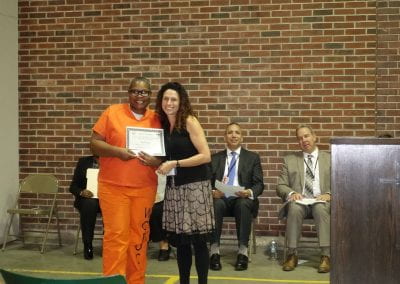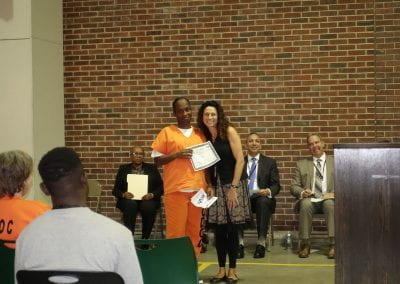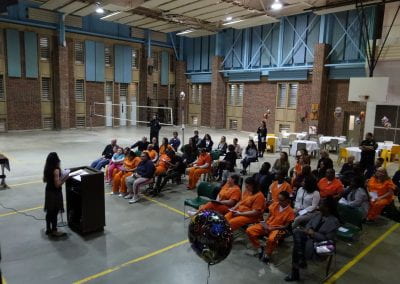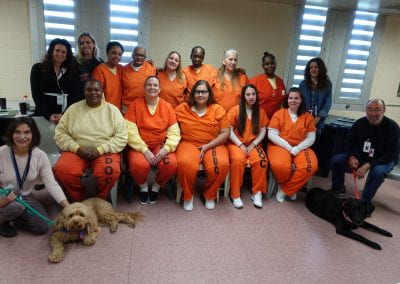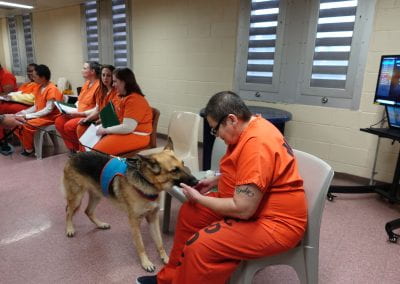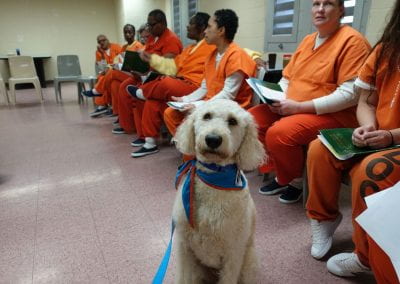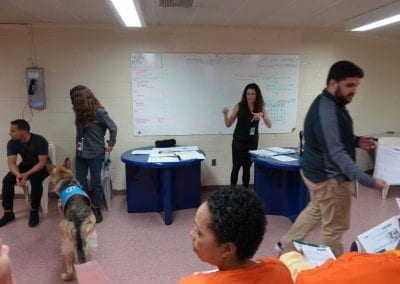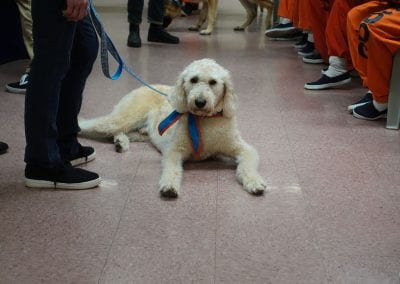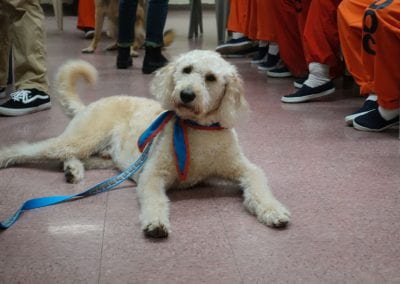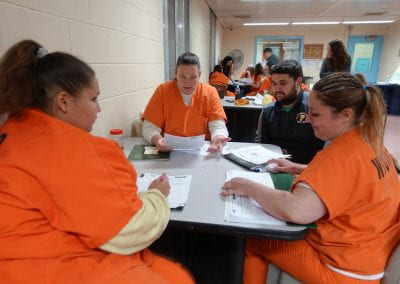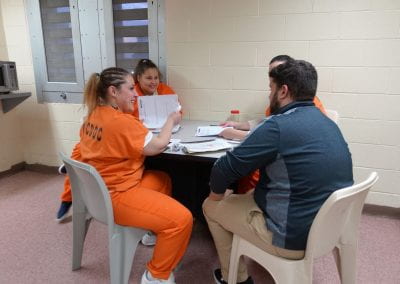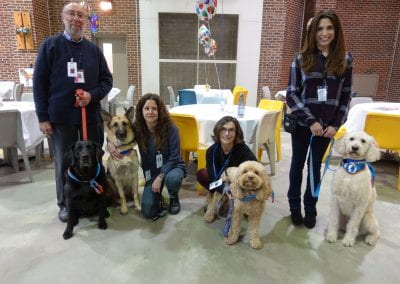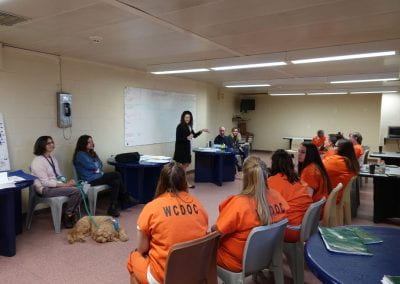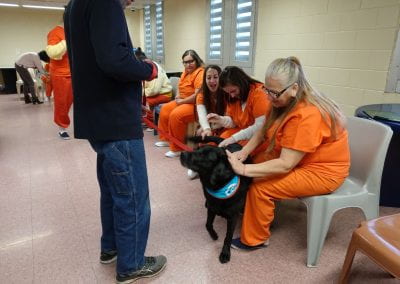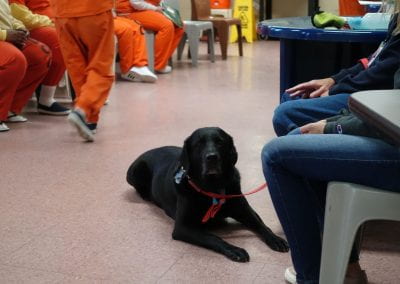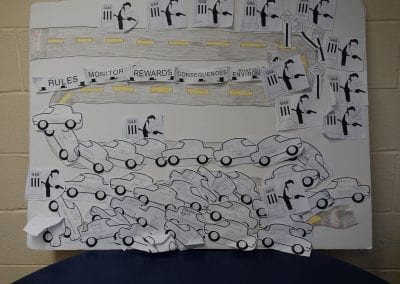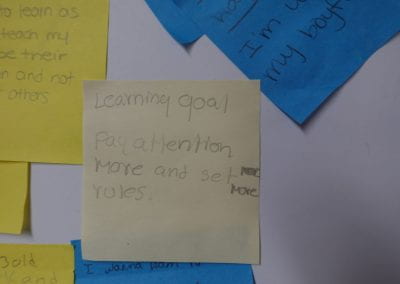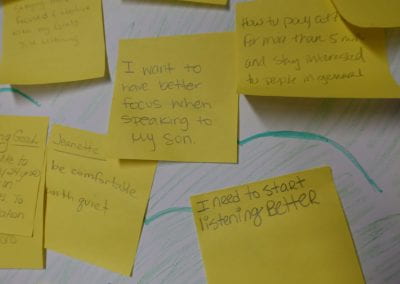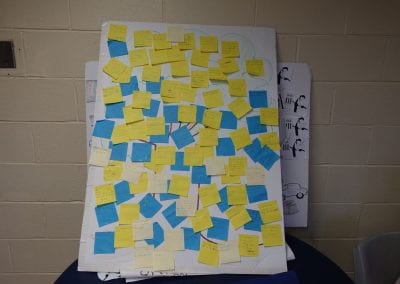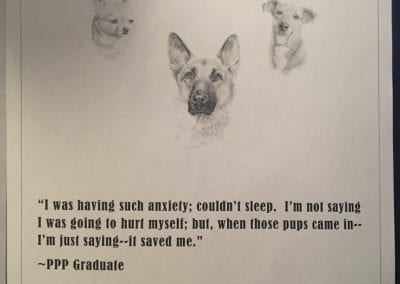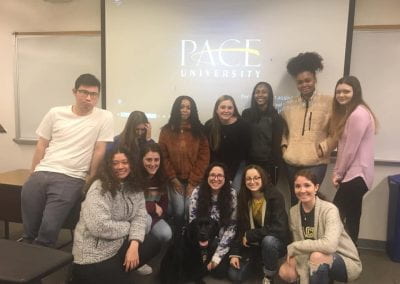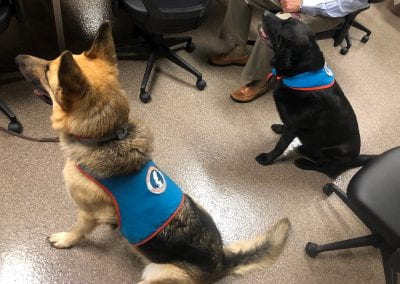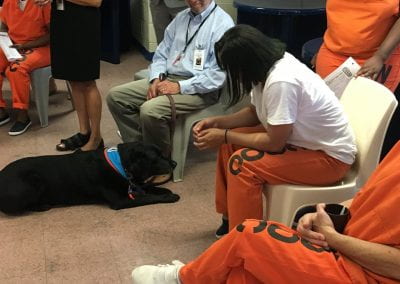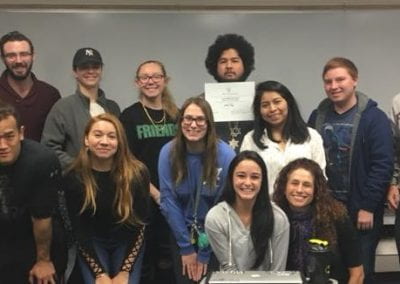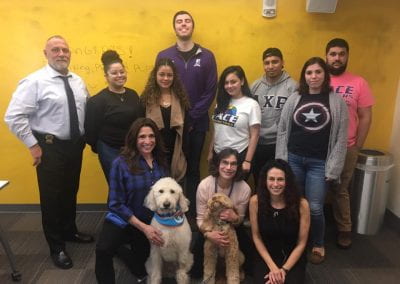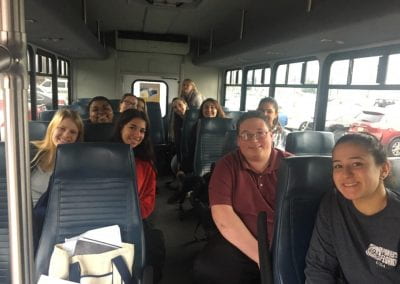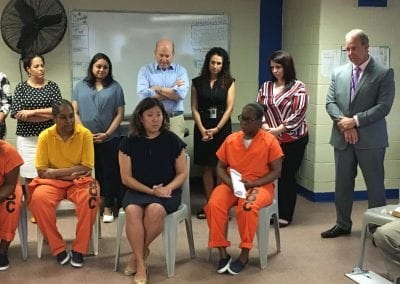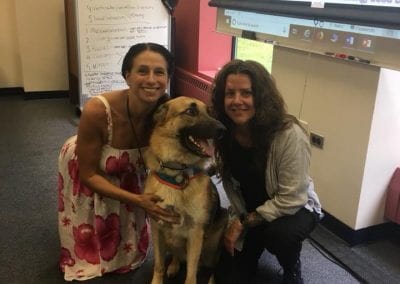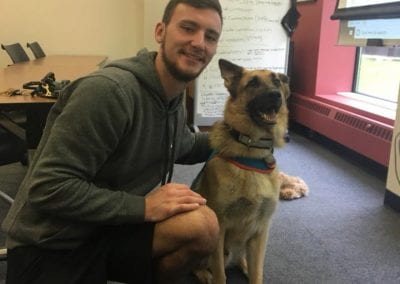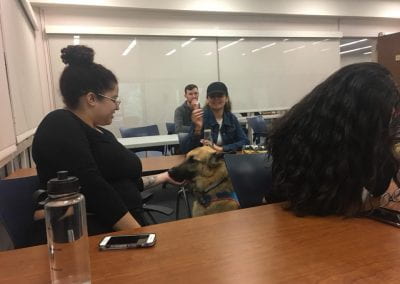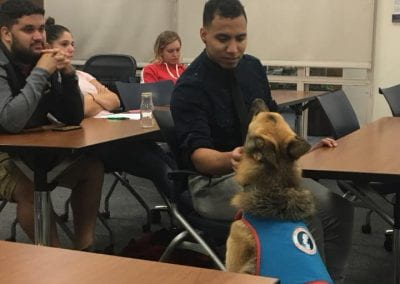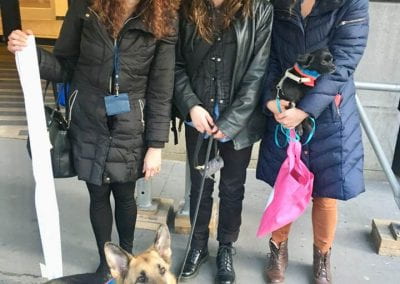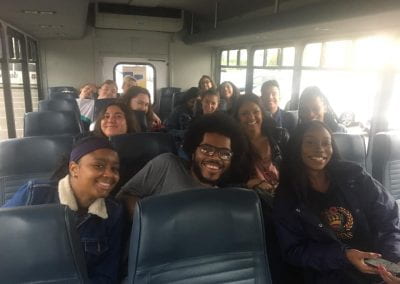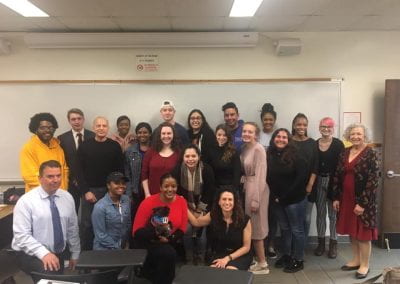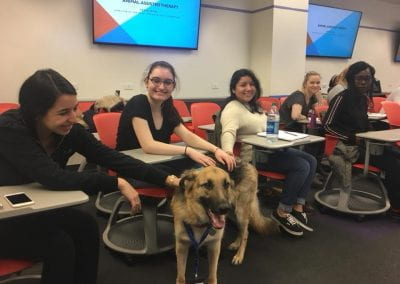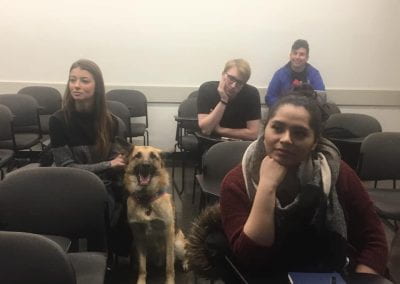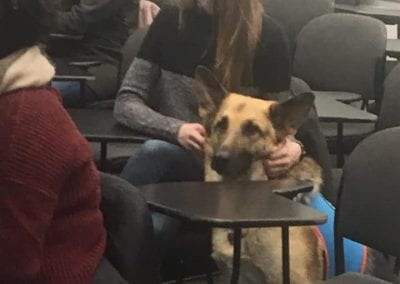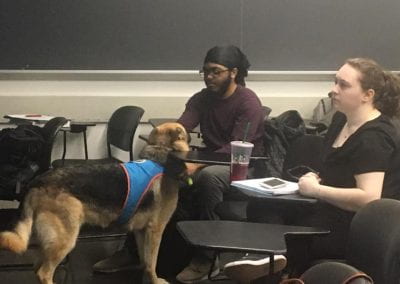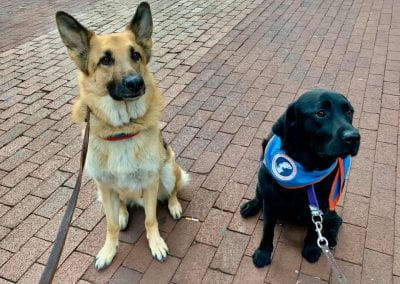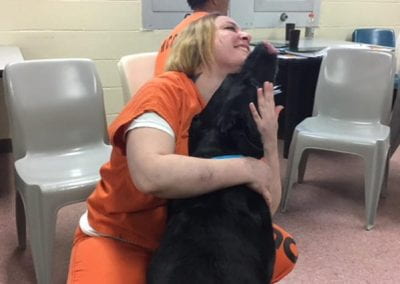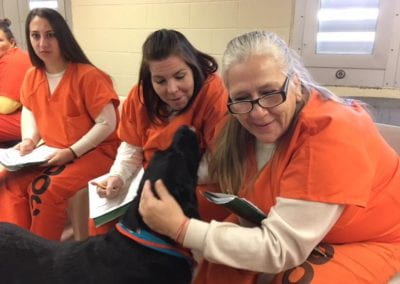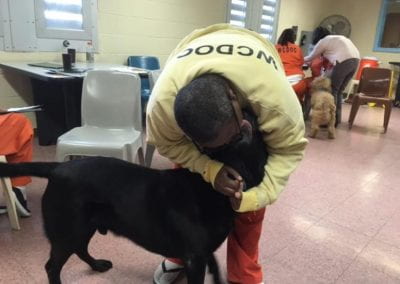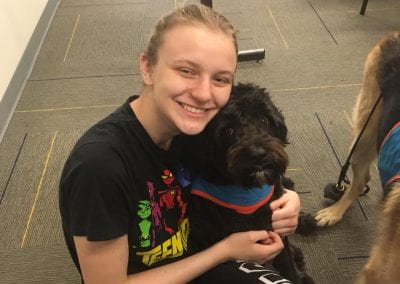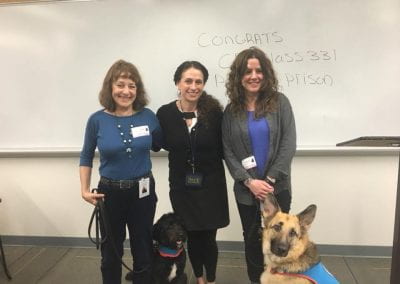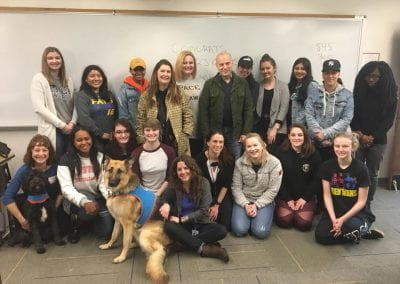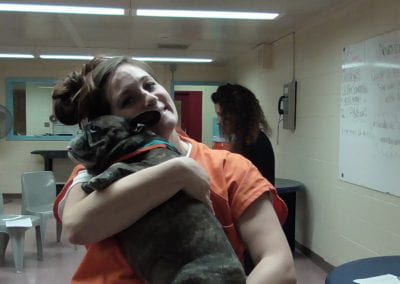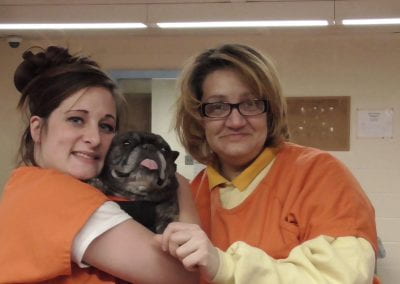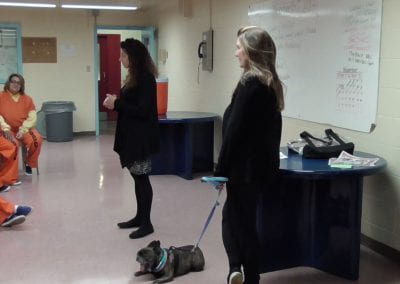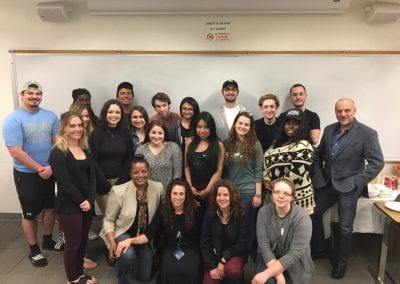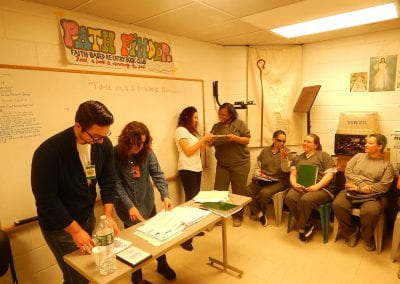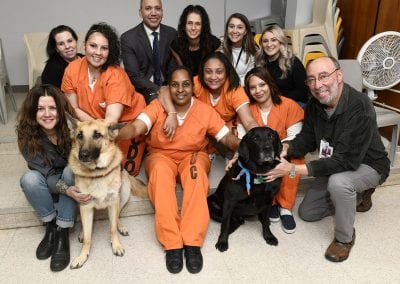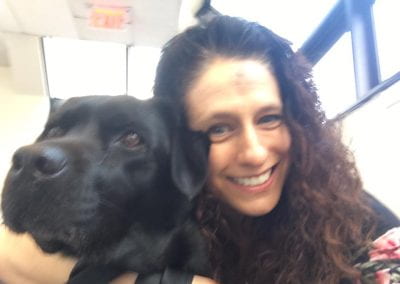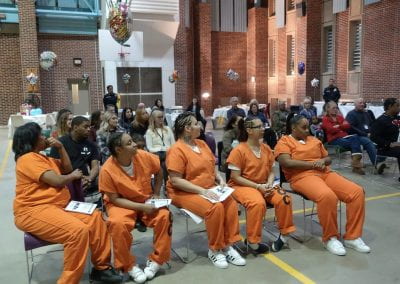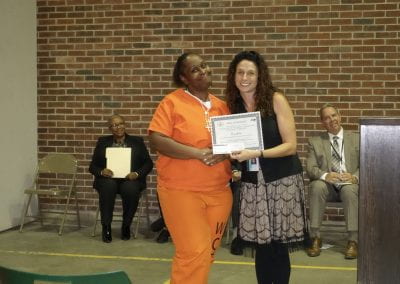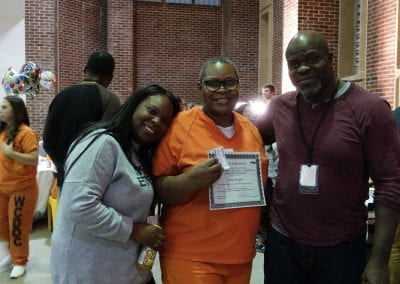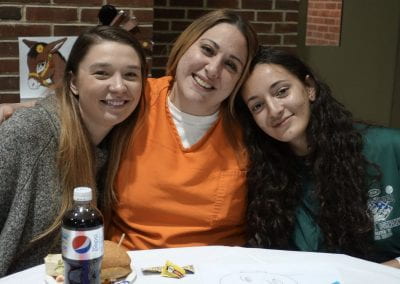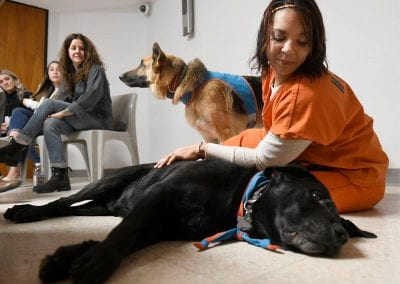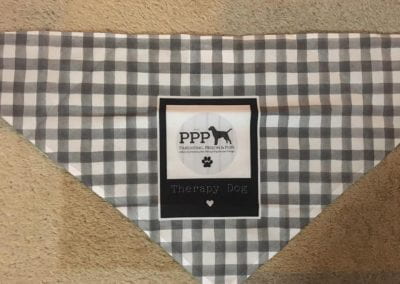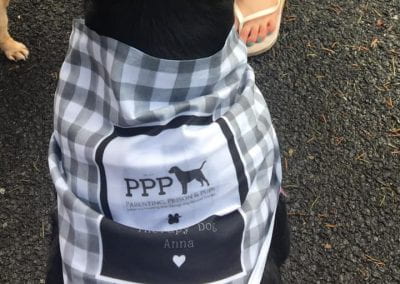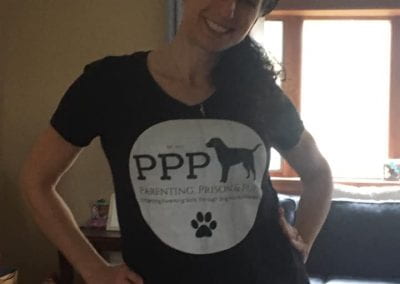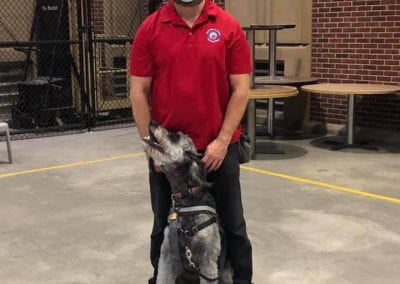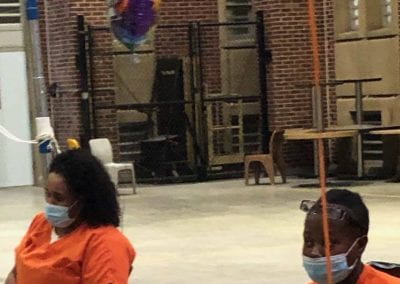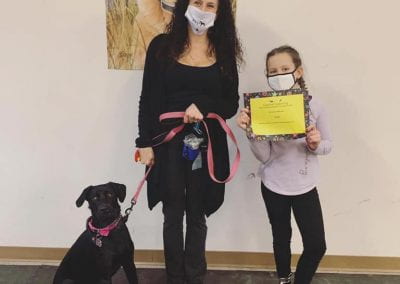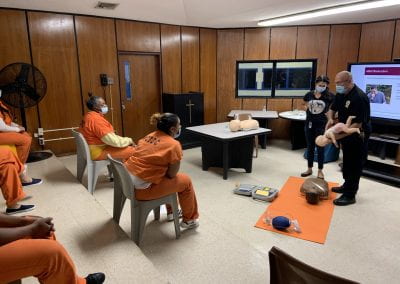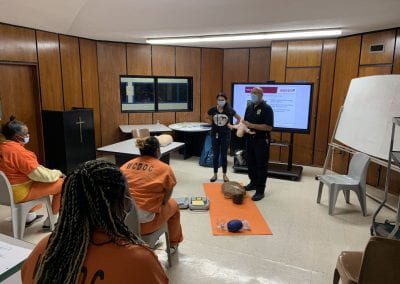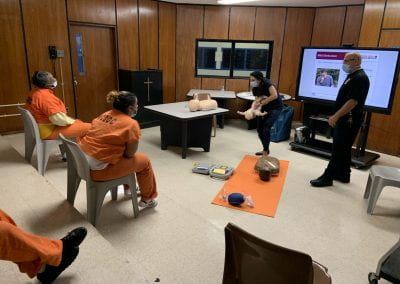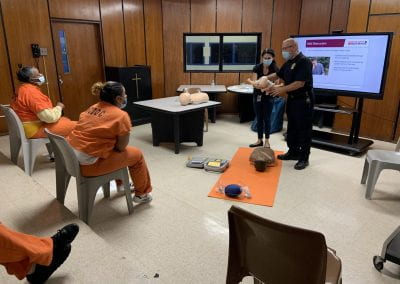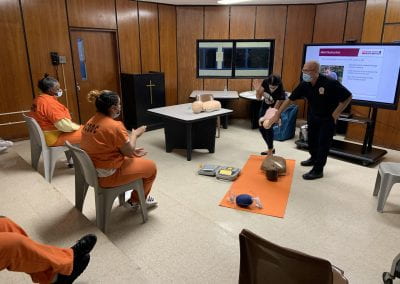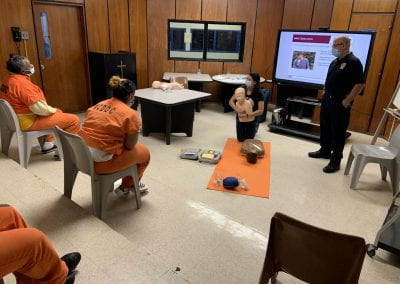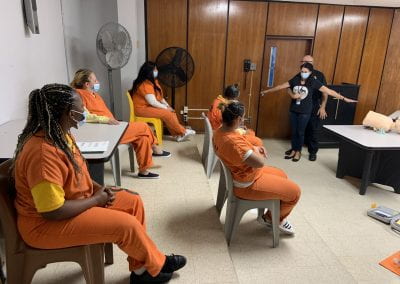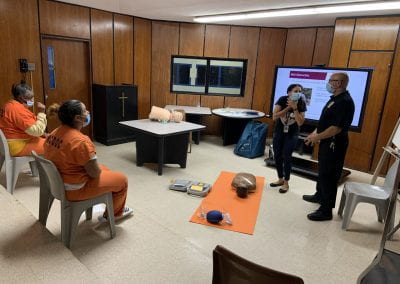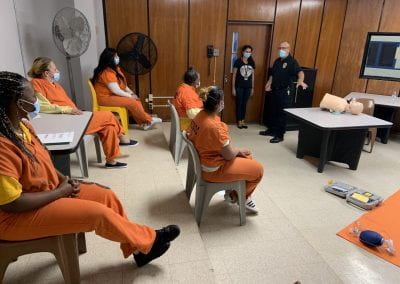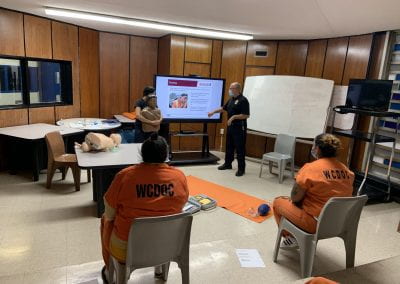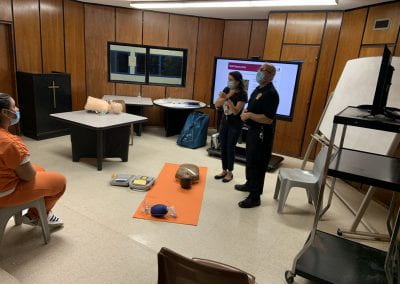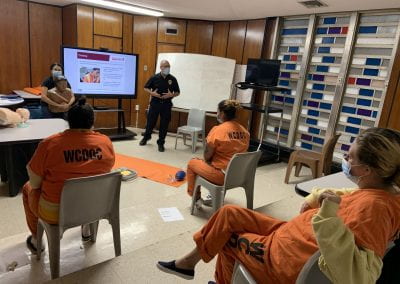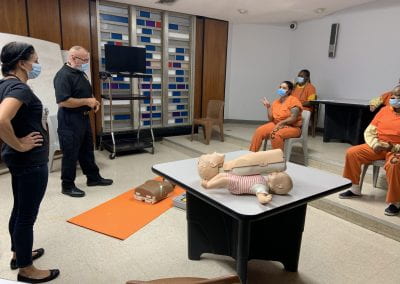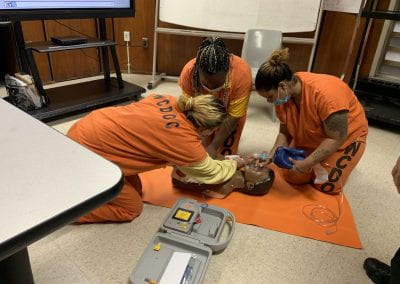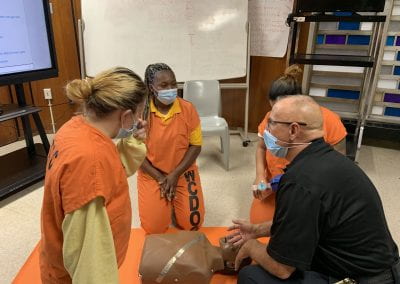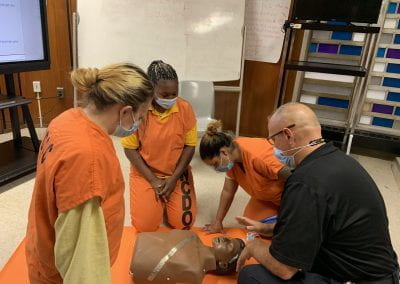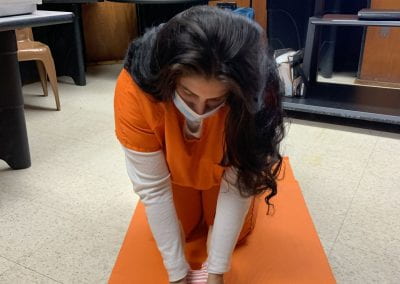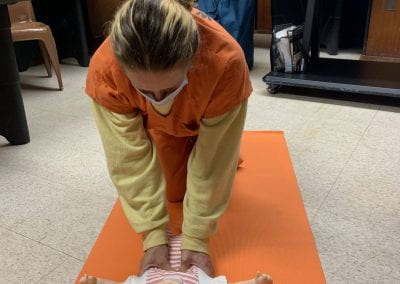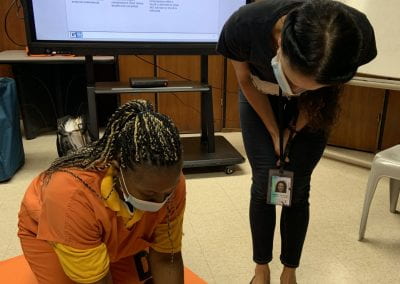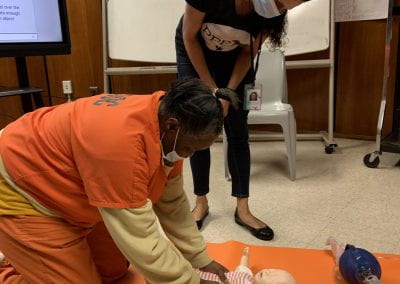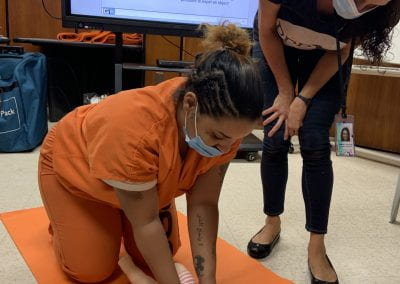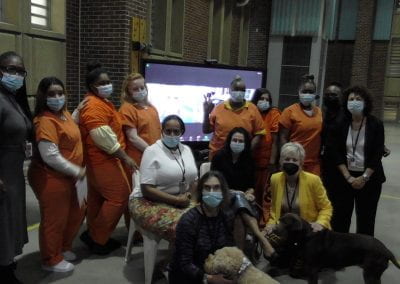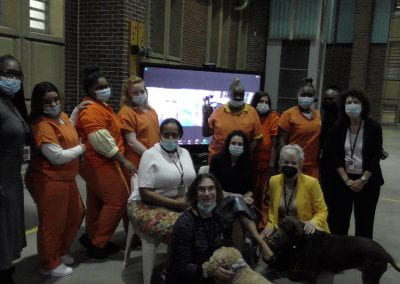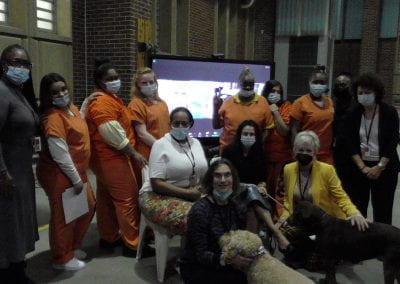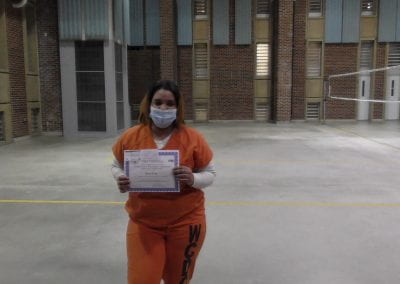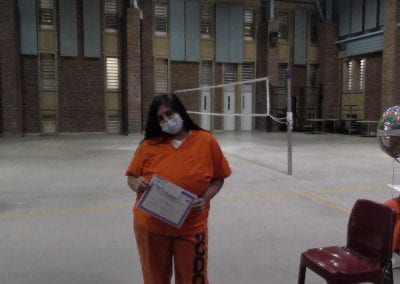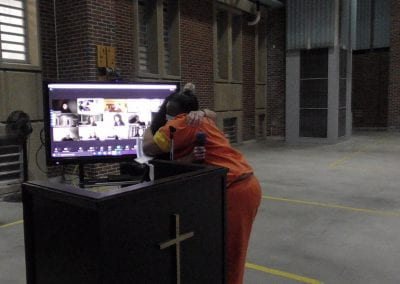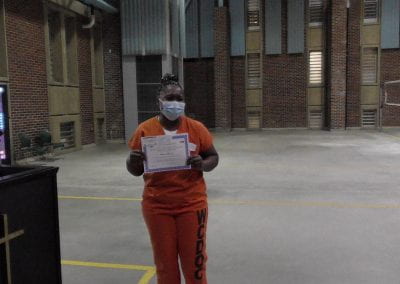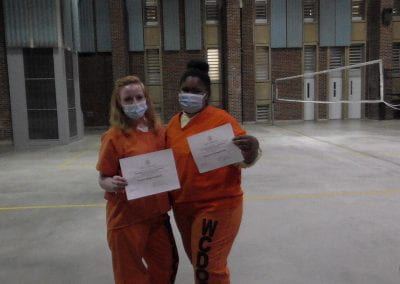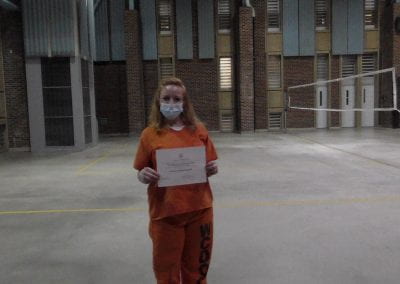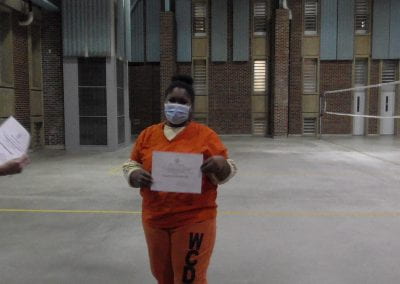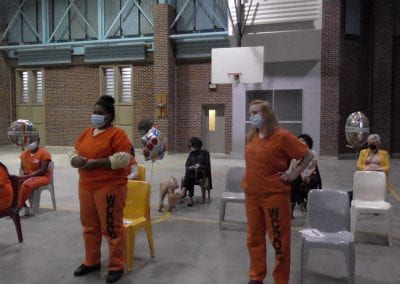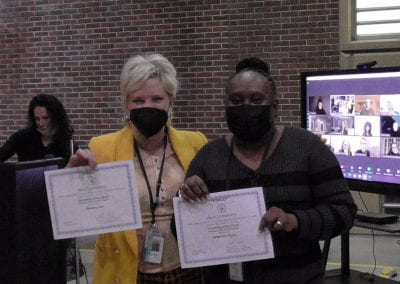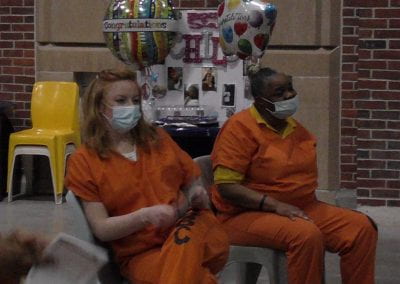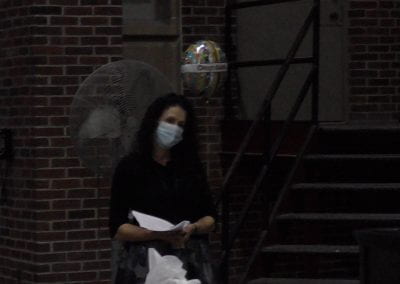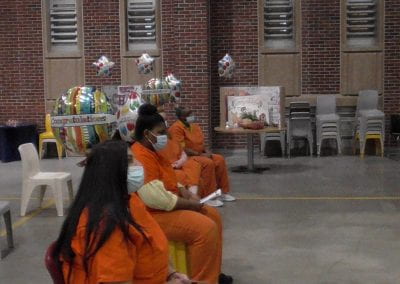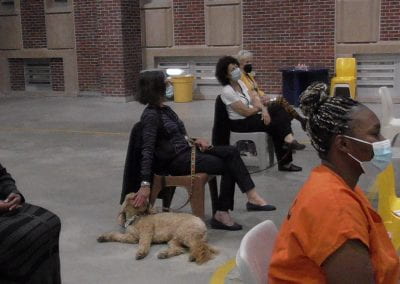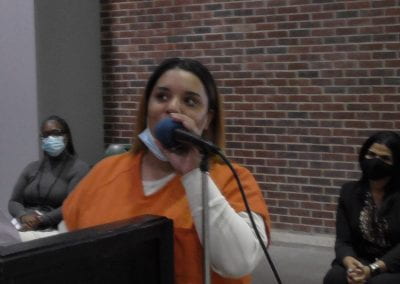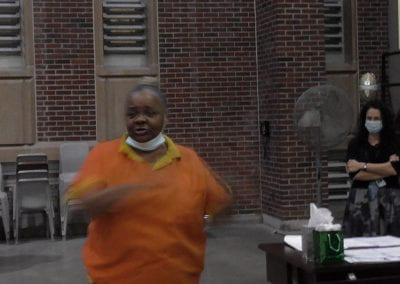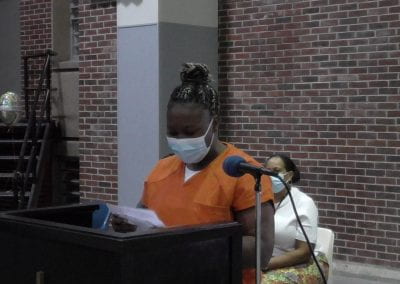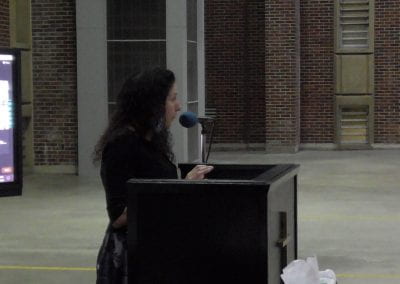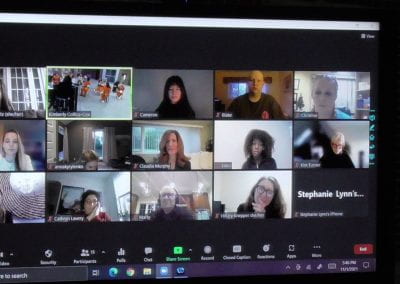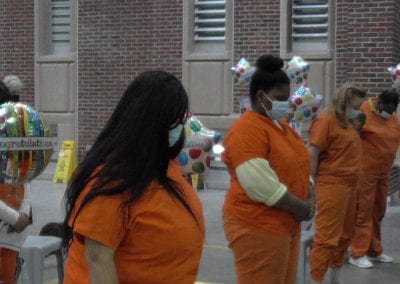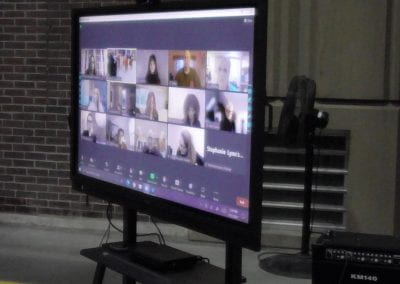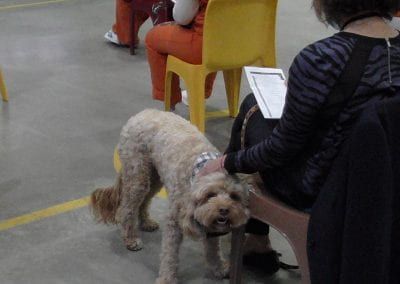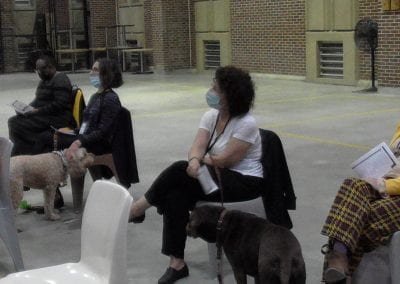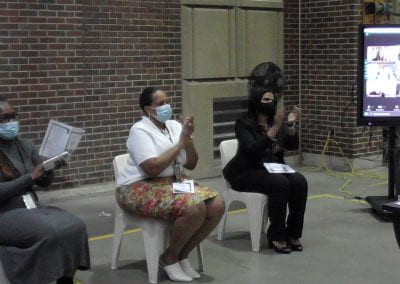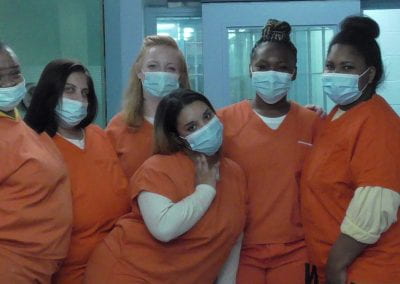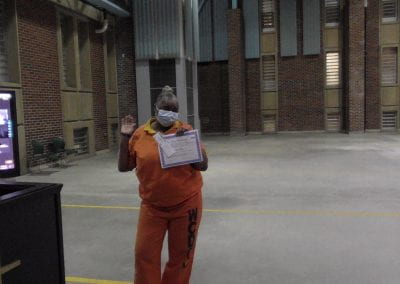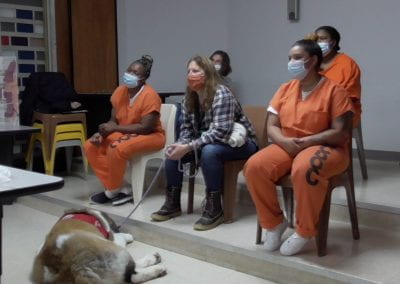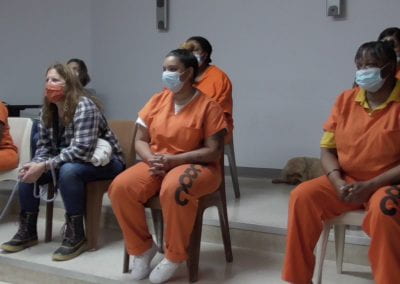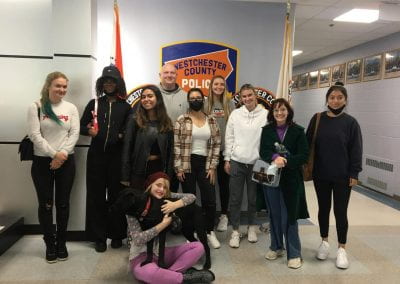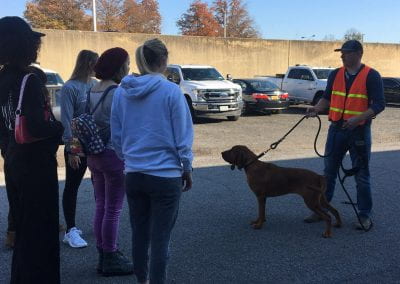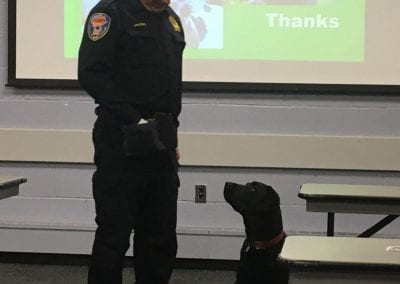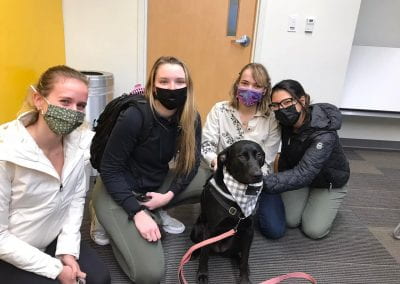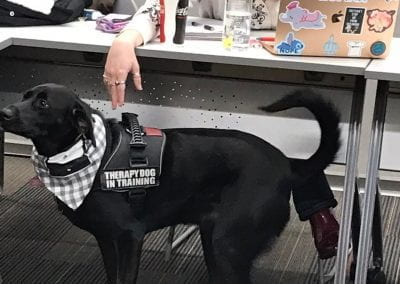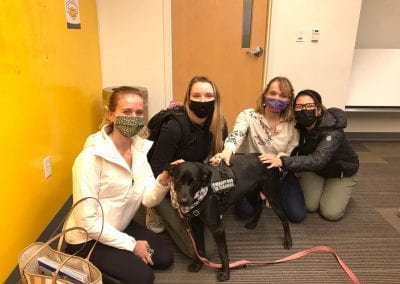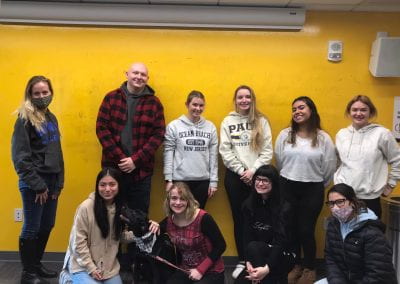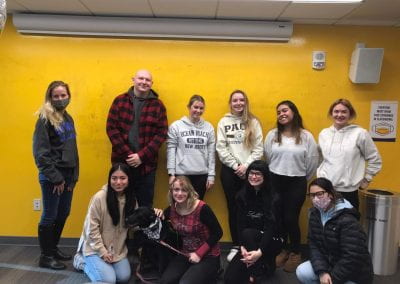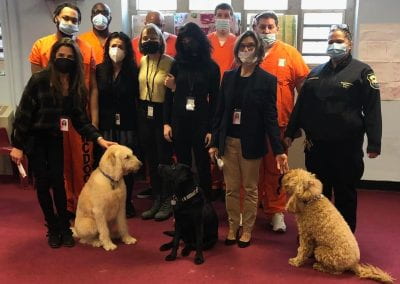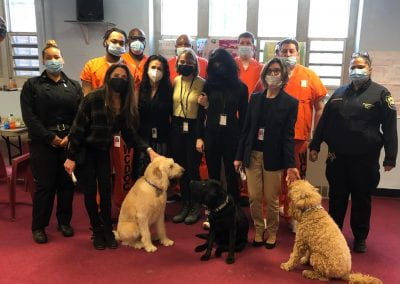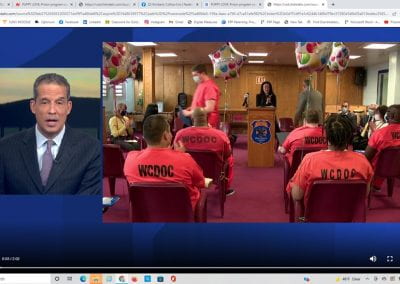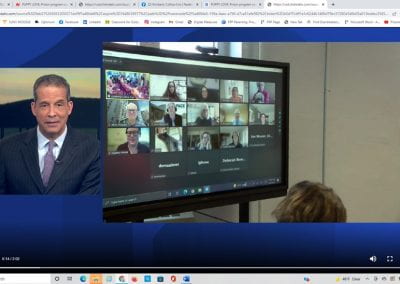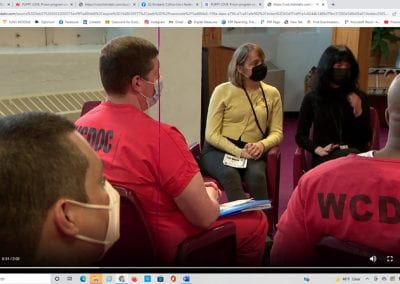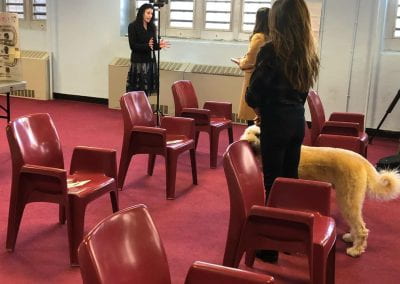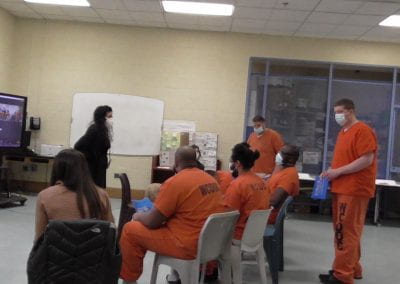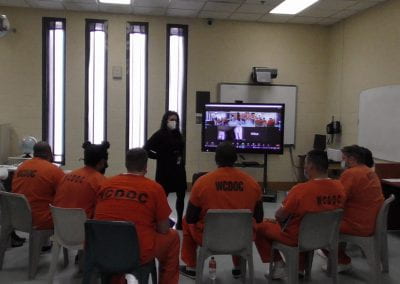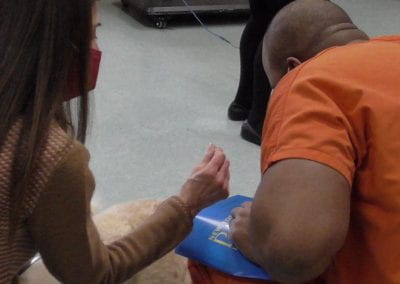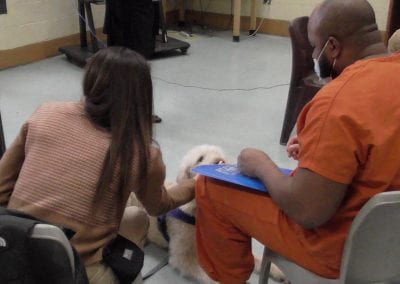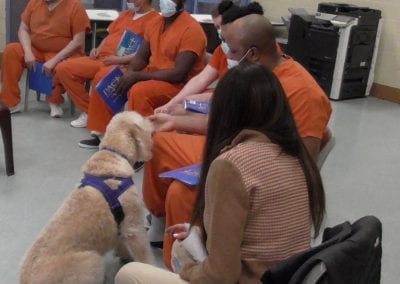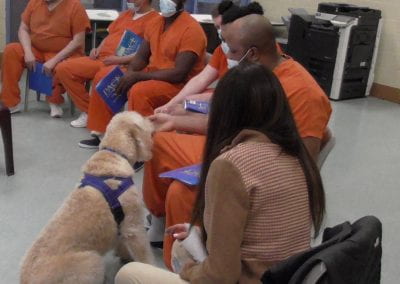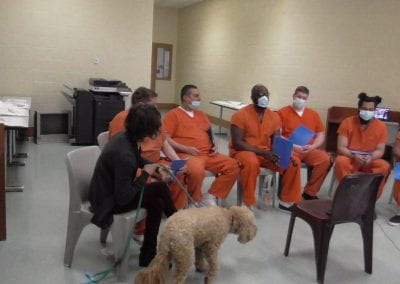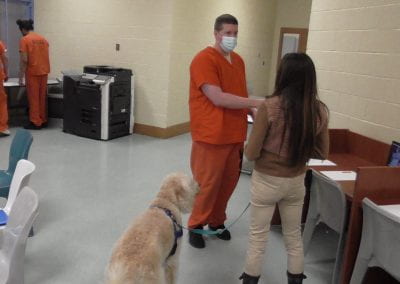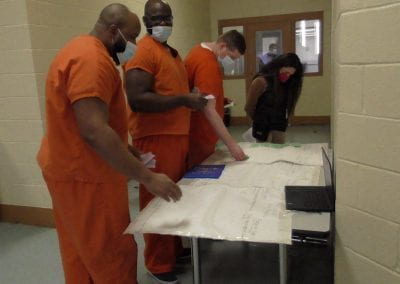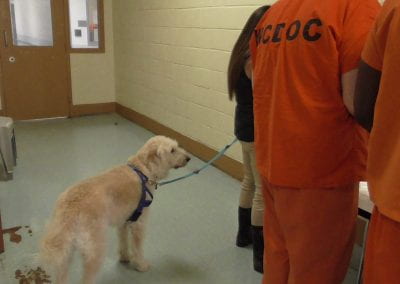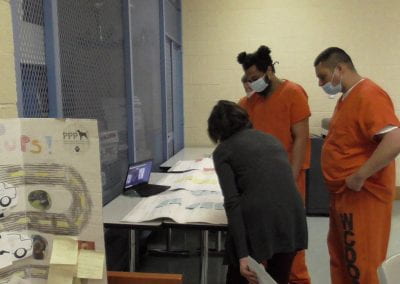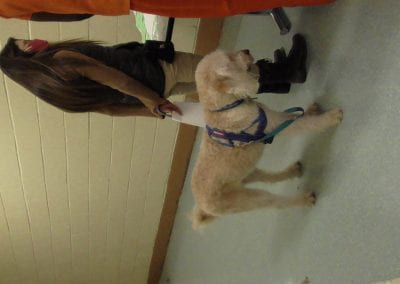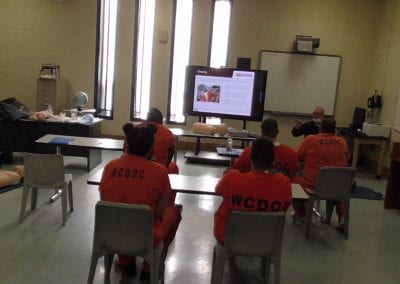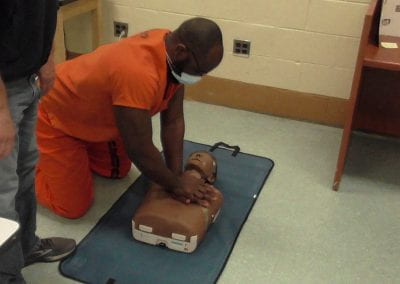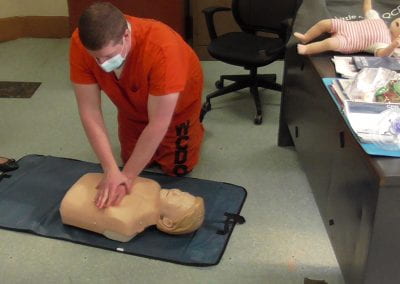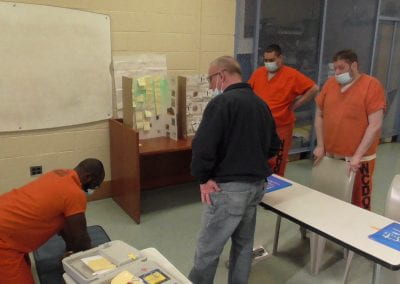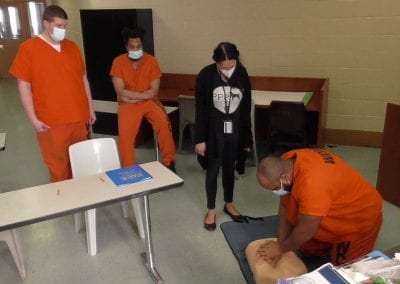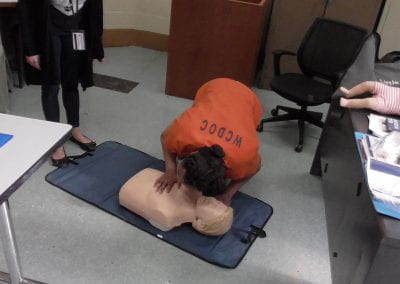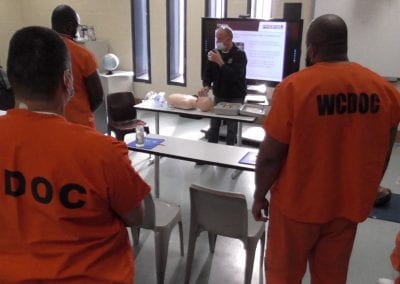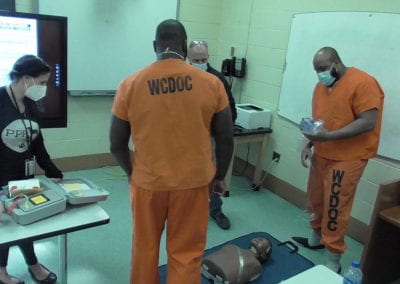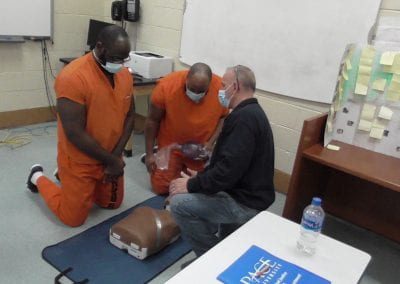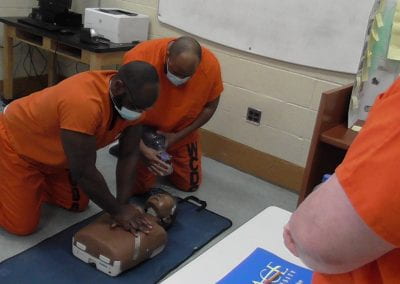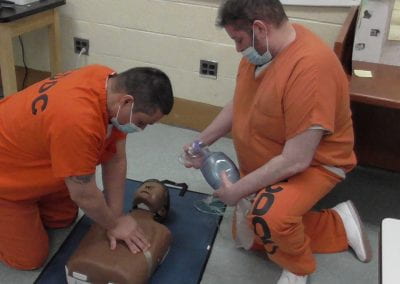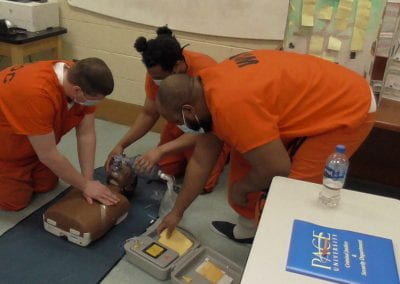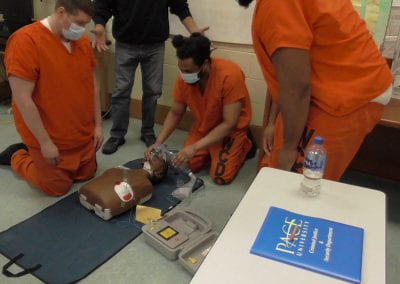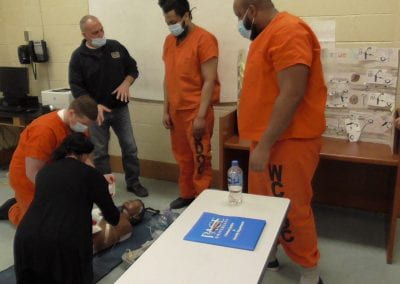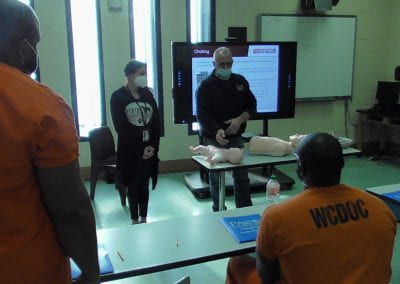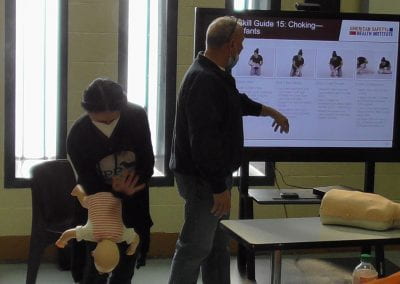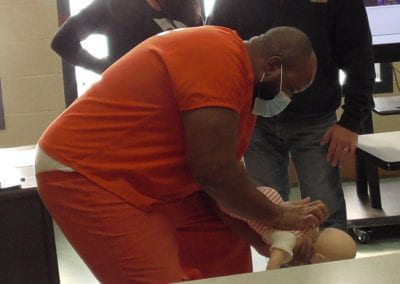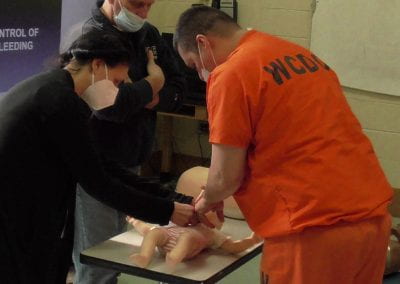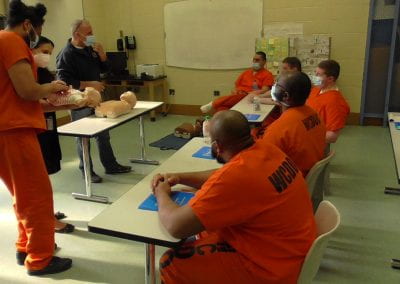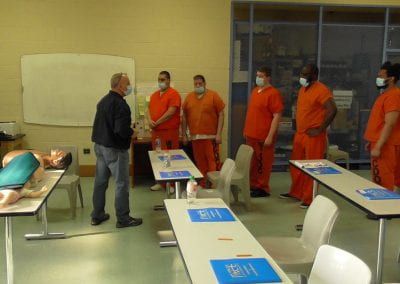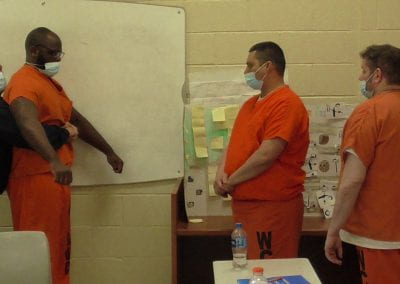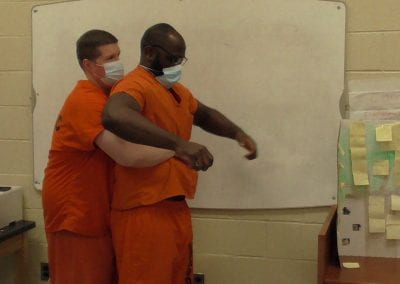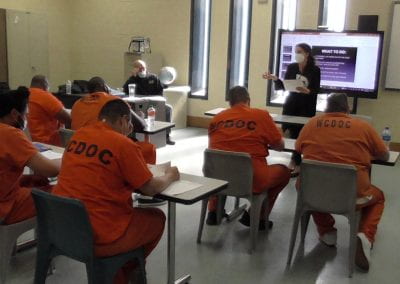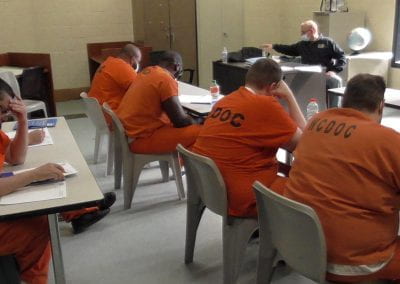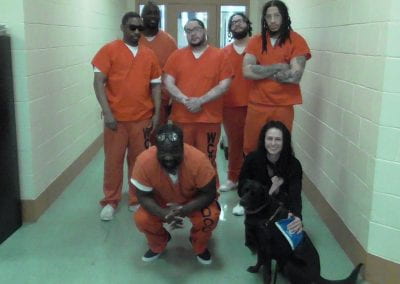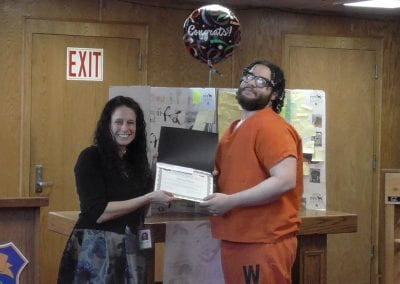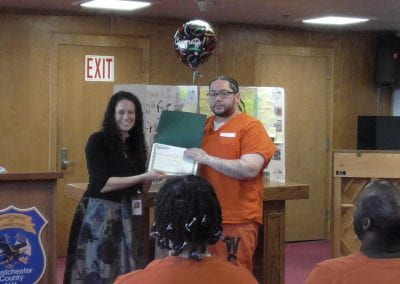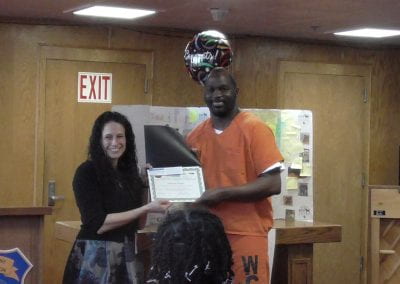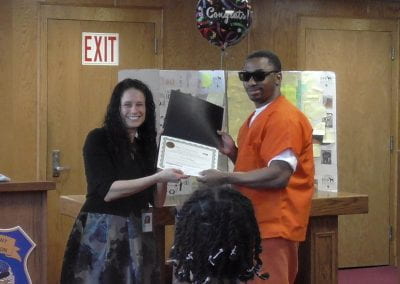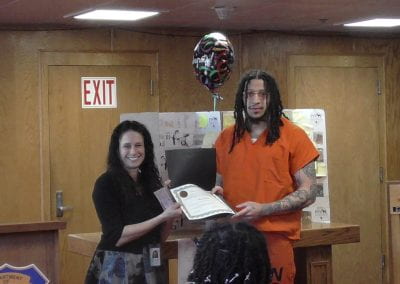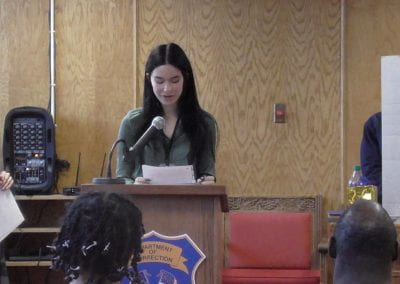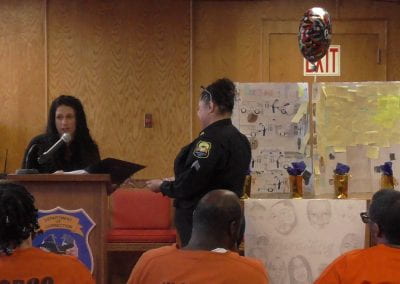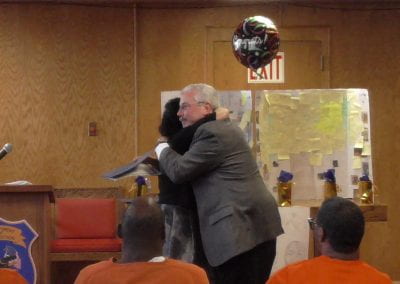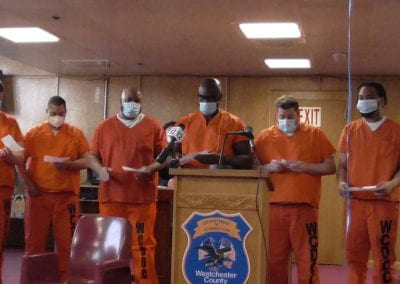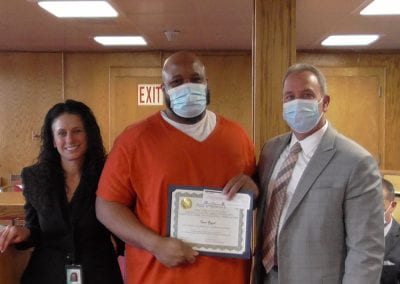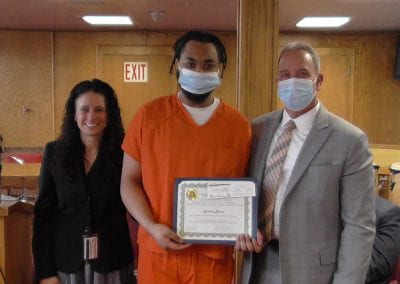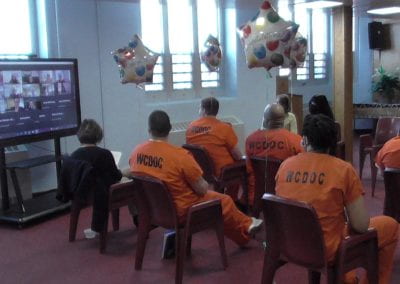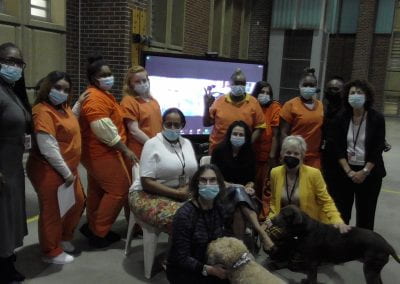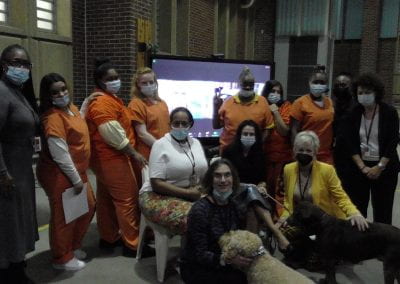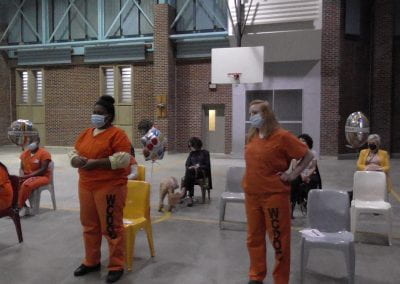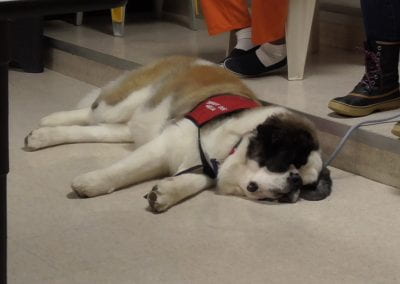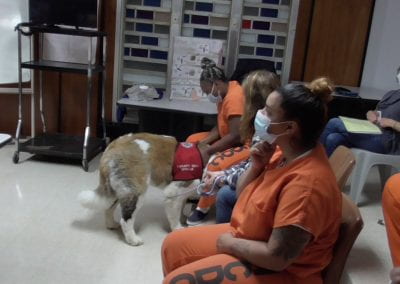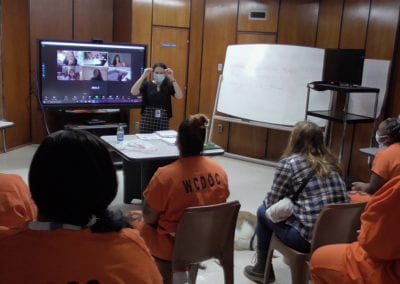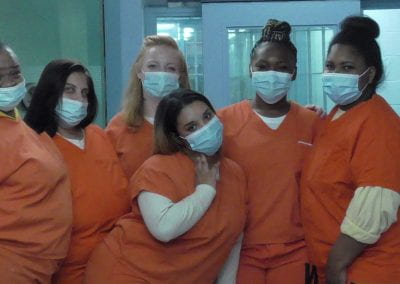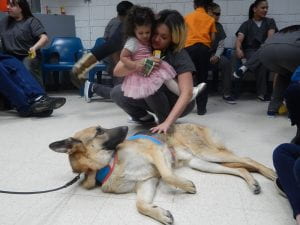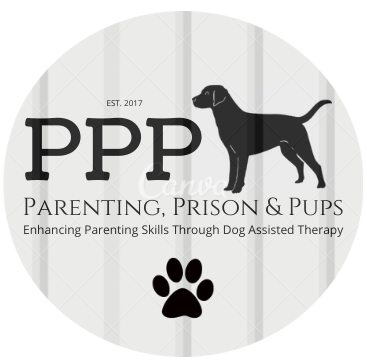
ABOUT PPP
Parenting, Prison & Pups (PPP), the only program of its kind, is an evidence-based parenting program, initially provided to incarcerated women in jail, the most underserved of all corrections populations, to help them reinvest in their relationships with their children. In January of 2022, we were proud to expand our programming to incarcerated fathers. We utilize the Parenting Inside Curriculum (PIO) and enhance it with Animal-Assisted Therapy (AAT). PIO was reviewed by the Substance Abuse and Mental Health Services Administration (SAMSHA) and is now included on the National Registry of Evidence-based Programs and Practices (NREPP). Both programs are provided at the Westchester County Department of Correction utilizing Pace students as teaching assistants.
PPP serves to support healthy bonds between incarcerated parents and their children. PPP also helps incarcerated parents to mend relationships with other family members, including relationships with their children’s caregivers. Healthy relationships between parents and their children can serve as a protective factor against recidivism for mothers and fathers and may prevent future involvement in the criminal justice system for their children. Our program is integrated with the use of AAT to provide a safe environment for our parents to process trauma-based feelings and to provide a safe environment for their children during our reunification efforts.
PPP consists of a strong partnership between Pace University and The Dyson College of Arts and Sciences’ Criminal Justice Department (the NYC and Westchester Campuses), the WCDOC (the Westchester County Department of Correction – a county jail located in Valhalla, NY) and Hudson Valley Paws For A Cause who is not only a leader in animal-assisted therapy but whose mission is to help those in need of emotional support of any kind. All of their dog/handler teams are registered therapy teams, insured, highly trained, certified Reading Education Assistance dogs and Red Cross volunteers.
HISTORY
Envisioned in 2015, Dr. Collica-Cox partnered with The Good Dog Foundation, who served as a community partner with PPP from Fall of 2015 to Spring of 2020, to develop and create a parenting program for jails that could be integrated with AAT. Working closely with Lisa Rae Johnson from MCC, Nory Padilla from WCDOC, and Bruce Fagin and Renee Payne from The Good Dog Foundation, PPP was in the planning and approval stages for two years. The program was first implemented in 2017 but it was implemented without therapy dogs. Dr. Collica-Cox and Ms. Johnson used this time to work through operational issues and Dr. Collica-Cox and Renee Payne, Director of Training for the Good Dog Foundation and owner of “Walk This Way”, used this time learn how to best incorporate the therapy dogs into the PIO curriculum. Finally in January of 2018, PPP had its first class fully integrated with AAT at MCC and in September of 2018, PPP had its first class fully integrated with AAT at WCDOC. Since MCC’s closure in 2021, PPP only provides programming at WCDOC. Therapy dogs are utilized in PPP in three ways: 1. AAA (Animal-Assisted Activity) – our class participants have free time to spend with the therapy dogs before and after class, 2. Emotional Support – our therapy dogs serve as emotional support for our participants as they process difficult emotions and come to terms with their trauma-based pasts, and 3. AAT – therapy dogs are integrated into the curriculum and serve as examples for difficult concepts and lessons. The program has proved to be very successful, winning several awards, including the National Jefferson Award, which is considered the Nobel Prize for Public Service.
formerly dd
OUR RESEARCH
PPP involves a multi-year research study. Utilizing a pre and posttest quasi experimental design, we are evaluating whether incarcerated parents, housed in WCDOC (and formerly MCC), who complete this evidence-based parenting program, have lower measures of stress, parental stress, anxiety, depression, and disciplinary infractions in addition to higher levels of self-esteem, increased parental knowledge, increased contact with their children, and more confidence in their parenting skills, upon program completion.
Therapy dogs are known to benefit humans in a number of different ways, including:
- Reducing anxiety and stress, while increasing well-being
- Facilitating better communications
- Enhancing the learning environment
The AAT activities are structured to support lesson plans that comprise the 14-class parenting curriculum for incarcerated women and men, who are housed at the Westchester County Jail. We will determine if there are measurable differences following an AAT intervention. Our goals are as follows:
OUR GOALS:
Goal #1: Determine whether incarcerated parents who complete an evidence-based parenting course with structured AAT have fewer psychological stresses (i.e., lower levels of stress, anxiety, depression, parental stress and higher levels of self esteem) following the AAT intervention.
Goal #2: Determine whether incarcerated parents who complete an evidence-based parenting course with structured AAT maintain low disciplinary infractions and recidivism rates following the AAT intervention.
Goal #3: Determine whether incarcerated parents who complete an evidence-based parenting course with structured AAT have increased contact with their children, children’s caregivers and/or family members following the AAT intervention.
Goal #4: Determine whether incarcerated parents who complete an evidence-based parenting course with structured AAT report more confidence in their parenting skills and obtain higher scores on a parenting skills knowledge test following the AAT intervention.
Goal#5: Determine through qualitative analysis (based on extensive class observations/field notes), individual progress made by each participant as they practice and report on skills learned following the AAT intervention.
Goal #6: Determine through qualitative (based on extensive class observations) and quantitative (HAIS scale) analyses whether having therapy dog teams present for unstructured animal assisted activities (AAA) during a jail-sponsored family reunification day impacts the children of incarcerated parents. We will examine if the children of incarcerated parents appear to experience limited stress or anxiety (good emotional affect) during their visit with their mother/father and whether they engage (and enjoy engaging) with the therapy dogs during their visit.
Goal #7: Determine whether incarcerated parents who complete an evidence-based parenting course with structured AAT have higher levels of class engagement (via disclosure) and retention when compared to the earlier group without AAT.
Goal #8: Determine whether incarcerated men have similar outcome measures when compared to their female counterparts.
This is the first research program of its kind, and we are excited by the potential to be supportive of incarcerated mothers, fathers and their children. Approximately 70% of incarcerated women are responsible for a minor child and at least 1.7 million children nationally have a parent who is incarcerated. We hope our research will show that Parenting, Prison, & Pups can enhance the bonds between incarcerated parents and their children, reduce recidivism, and mitigate inter-generational offending patterns.
PPP is about Helping People . . .
FOR OUR PACE STUDENTS
Learn more about the Criminal Justice Department
Join Our Jail-Based Services
Students enrolled in CRJ 331 – Strategies in Corrections Administration – offered every Fall – This is a civic engagement course where students complete 20 service hours outside of our classroom by serving as teaching assistants for PPP. Students work directly with the women at the jail, they receive specialized training in both AAT and in working effectively in the corrections setting, and they visit with the Lifer’s Group at The East Jersey State Prison to learn about the experiences of incarcerated men. This program has proved to be transformative for our students and provides excellent work experience. Interested students should email Dr. Collica-Cox at kcollicacox@pace.edu from the Criminal Justice Department if they want to register for this hybrid course, which is held during the fall semester in Pleasantville. NYC students are encouraged to join. You may also obtain more information by speaking with Pace University’s Center for Community Action and Research (CCAR).
Students enrolled in CRJ 251 – Introduction to Corrections – Spring Semester – also a civic engagement course and students can complete another 20 service hours in the PPP program. Students will work directly with incarcerated fathers and receive specialized training in AAT, as well as working effectively in the corrections setting. This hybrid class is offered every Spring semester in Pleasantville. NYC students are encouraged to join. Students can take both CRJ 251 and CRJ 331 for a year long experience.
Students in both CRJ 331 and CRJ 251 can Zoom into the regular course but will need to make 3 to 4 visits to the jail during the semester to fulfill their civic engagement hours. Students are never in the jail without Dr. Collica.
Inside Out Program
For students who have a larger interest in our jail-based services, please email Dr. Collica-Cox to reserve your spot in CRJ 242 – Crime and Public Policy, which is an “Inside-Out” class. It is the only such class offered at Pace University and there are limited spots for this course. This course is affiliated with the International Inside-Out Prison Exchange Program through Temple University. Inside-Out was an idea that originated between a lifer, Paul Perry, and Lori Pompa from Temple University, implementing their first session in 1997. Inside-Out” classes, which allow college students to take a credited course alongside the incarcerated in a correctional setting, is a great way to provide a missed opportunity for purposeful intervention for Inside students, while providing a unique experiential learning opportunity for outside students. Inside students receive three free college credits. Each spring semester, undergraduate students will take this class at the Westchester Jail with incarcerated men and women. Together, we will discuss the causes of crime and examine criminal justice policy. Students from both campuses are welcome and free transportation is provided from the Pleasantville Campus to the Jail and from the jail back to campus, in addition, transportation is provided from the Metro-North train station. Our goal is to integrate future classes with AAT to enhance college learning for both our inside and outside students at the jail. Please join us for this unique opportunity.
Read about our program:
Pace Program Gives Students an Inside Look at Criminal Justice
Pictures from the Inside Out Program
PUPPIES ON THE BLOCK
Puppies on the Block, an extension of the well-established and award-winning Parenting, Prison & Pups (PPP) Program, will serve as a puppy fostering, and initial training program, with women and young men incarcerated in the Westchester County Department of Correction (WCDOC). Puppies are provided by a rescue group, Paws Crossed Animal Rescue in Elmsford, NY, to be fostered in the jail for approximately two to four weeks at a time. Once the puppies are adopted, the women will have the opportunity to see a video recorded by the adoptive families to provide details about their new family member and to learn about their forever homes. During their time at the Westchester Jail, Puppies will be cared for by incarcerated women housed specifically in the drug treatment program, managed by Saint John’s Riverside Hospital, known as Solutions, in addition to being cared for by young incarcerated men, ages 18 to 25, in YOP (Young Opportunities Program). The dog rescue organization provides training for all participants on how to care for the puppies. Dr. Collica and her students will help to oversee the administration of the program. Students who participate in CRJ 331 (Parenting, Prison & Pups with Incarcerated mothers) and/or CRJ 251 (Parenting, Prison & Pups with Incarcerated fathers), will have the opportunity to participate in Puppies on the Block! Puppies on the Block will also consist of a research project to determine whether there are measurable changes in self-esteem, anxiety, stress, depression, self-efficacy, self-control, loneliness, empathy, happiness, and coping skills, after program participation. Students with program experience can serve as research and teaching assistants for these programs. The first litter (from the Peanuts’ gang) arrived on Tuesday, August 30th, 2022 from Peurto Rico – Welcome Snoopy, Linus and Frieda for our first fostering partnership with Heaven Can Wait!!!

Pictures from Puppies on the Block
Featured Video
Gallery of Events
Daisy
Daisy is an arson investigator who comes to meet our Pace students. She demonstrates how dogs are used throughout our criminal justice system.
The Kids
Our therapy dogs are there for the children who visit with their moms during the Reunification day
Graduation & Reunification
Our therapy dogs are there for the children who visit with their moms during the Reunification day
Graduation & Reunification
Our therapy dogs attend the MCC Graduation and Reunification Day to act as a source of support for visiting children.
The women in PPP
These women are enjoying some time with our therapy dogs. Picture by Barry Williams – DO NOT reproduce without the author’s permission
The Kids
Our therapy dogs are there for the children who visit with their moms during the Reunification day
Graduation
All women who graduate receive their certificate of completion, as well as a national certification in CPR, 1st Aid, and AED.
Graduation
All women who graduate receive their certificate of completion, as well as a national certification in CPR, 1st Aid, and AED.
Graduation
All women who graduate receive their certificate of completion, as well as a national certification in CPR, 1st Aid, and AED.
PPP
Students on a field trip to East Jersey State Prison to learn about the incarceration experience of men.
Picture by Barry Williams
Picture by Barry Williams – DO NOT reproduce without the author’s permission
Picture by Barry Williams
Picture by Barry Williams – DO NOT reproduce without the author’s permission
Meet Dudley – One of Our PPP Therapy Dogs for the Westchester County Department of Correction this Fall 2020
Meet Lulu – One of Our PPP Therapy Dogs for the Westchester County Department of Correction this Fall 2020
Meet Buddy – One of Our PPP Therapy Dogs for the Westchester County Department of Correction this Fall 2020
Meet Ophelia – One of Our PPP Therapy Dogs for the Westchester County Department of Correction this Fall 2020
Meet Harper – One of Our PPP Therapy Dogs for the Westchester County Department of Correction this Fall 2020
Anna Update – January 2021 – Anna finished “Beyond Basics” – intermediary canine training. Hopefully by summer, she will be ready for therapy dog training and eventually a member of PPP.
For the Family Members of our Incarcerated Students
This course is designed as a skills training program for incarcerated parents and is held biweekly over two months. The curriculum is rigorous and requires tremendous diligence from our students.
Only parents who attend all of the sessions, actively participate, and complete all out-of-class assignments, will receive a certificate of completion and graduate from our program. Our students are working on the following skills:

Implementing Effective Parenting Styles

Effective Speaking Skills
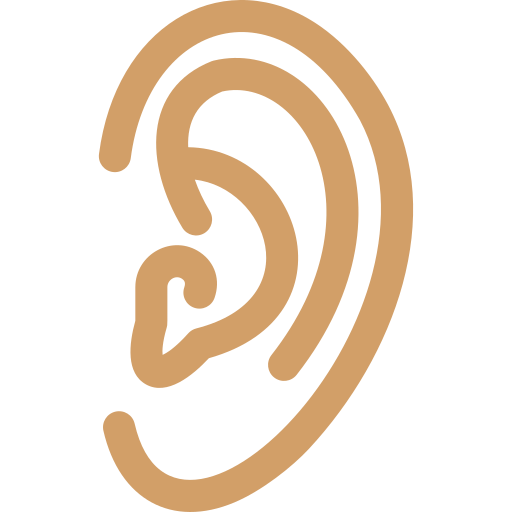
Effective Listening Skills

Effective Problem Solving skills

Engaging in Child Centered Play

Learning The Child’s Job and the Parent’s Job

Giving Effective Directions and Encouragement

Providing Structure Through Rules, Rewards and Consequences

Going Home: What to Expect with their Children

Managing Healthy Adult Relationships

Stress Management

CPR (Adults, Children & Infants), AED and First Aid Certification

NURTURING THE CHILD’S TEMPERAMENT
STRUCTURE THROUGH FAMILY ROUTINES
YOGA
GRADUATION & FAMILY REUNIFICATION

Please Note
No confidential information can be given about any of our individual students. We cannot confirm their attendance, but if you are invited to the graduation, it means your family member successfully completed the program.
Our next program for women at WCDOC will begin in Sept 2024. Family members of our students will be personally invited by their loved one to attend our graduation ceremony Tuesday, November 1st from 9:30 to 11:30AM.
Our next program for men at WCDOC will begin January 2025. Family members of our students will be personally invited by their loved one to attend our graduation ceremony – Date TBA.
All visitors must be approved prior to admittance.
PPP is entering its 7th year. Our first classes at both MCC (Metropolitan Correctional Center – a federal jail) & WCDOC (Westchester County Department of Correction – a county jail) proved beneficial for our mothers and for the Pace Students involved with the program. Data collection and analysis is ongoing.
Benefits of PPP
- Statistically significant decreases in depression and parental stress, as well as higher levels of self-esteem, for incarcerated women at the federal jail.
- Statistically significant decreases in depression, as well as higher levels of parental knowledge for incarcerated women at the county jail, who presented with much longer histories of drug use and criminal justice involvement.
- More confidence in parenting skills and better relationships with family members reported for both groups.
- Better communication skills reported for both groups.
- Data for incarcerated fathers is forthcoming.
- “It wasn’t just a regular parenting class, it was more than that. It felt so good and it made me feel so good as a person” (Incarcerated Mom, WCDOC)
- “This class opened us up in ways that we normally wouldn’t. People were more responsive. There were many benefits. For me, personally, it was a benefit for me to think of myself as a mom and the methods I utilized. “ (Incarcerated Mom, MCC)
- Pace Students learned they could have a positive impact & wanted to engage in more public service
- “This was more of a class on humanity as much as civic engagement or criminal justice. We got to see a population that is looked down upon, stigmatized, ridiculed, but hearing them really hit me in the heart” (Pace Student, Westchester)
DONATIONS
If you are interested in donating to PPP, Inside-Out, or Puppies on the Block, please contact Kim Turner, The Director of Development, in Pace’s Development Office at kturner@pace.edu or 914-773-3112.
ADDITIONAL INFORMATION
Please feel free free to visit our FaceBook page or Dr. Collica-Cox’s Faculty page.
Thank you for your interest and your support!
Media
PPP Video of the Men’s 1st gradution – News 12
News 12 – PPP 1st Parenting Graduation for Men
News 12 Westchester reports on PPP
PPP Director being interviewed on Newsbreakers
PPP Staff and Students Interview on 880 News with Sean Adams
Not Alone – Voices From Participants, Staff & Students
Dr. Collica’s Interview with Sage Publications
Pace University Students Work with parents Who Are Incarcerated
PPP Journal Articles
Collica-Cox, K., & Day, G. (2021). When Dogs Make the Difference: Jail-Based Parenting With & Without Animal-Assisted Therapy. Criminal Justice Policy Review. https://doi.org/10.1177/08874034211063455
Collica-Cox, K., & Day. G. (2021). Dogs as Therapeutic Partners, not Therapeutic Tools: Ethical Considerations for AAT in the Correctional Setting. [Special Issue – Human-Animal Interactions and Issues in Criminal Justice: Toward a Humane Criminology]. Social Science, 10 (11), 432 . https://doi.org/10.3390/socsci10110432
Collica-Cox, K. (2020). Civic Engagement for the Future Criminal Justice Professional: Serving the Underserved in a Correctional Setting. The Journal of Community Engagement and Scholarship, 12 (2), 10-21. https://digitalcommons.northgeorgia.edu/jces/vol12/iss2/3
Collica-Cox, K., & Furst, G. (2020). Prisoner parenting: Parenting from a federal jail. The Journal of Correctional Health Care, 26 (2). https://doi.org/10.1177/1078345820916475
Collica-Cox, K., & Furst, G. (2019). Parenting From a County Jail: Parenting From Beyond the Bars. Issues in Mental Health Nursing, 40 (7), 593-604. https://www.tandfonline.com/doi/abs/10.1080/01612840.2019.1565877?af=R&journalCode=imhn20
Collica-Cox, K., & Furst, G. (2019). Implementing and Studying Successful Jail-Based Programming for Women: A Case Study of Parenting, Prison & Pups – Waiting to ‘Let the Dogs In’ Journal of Prison Education and Reentry, 5(2), 101-119. https://scholarscompass.vcu.edu/jper/vol5/iss2/4/
Collica-Cox, K., & Fagin, B. (2018). Parenting, prison & pups: Parenting with a purpose. Corrections Today, 80 (3), 24-32, 10. http://www.aca.org/ACA_Prod_IMIS/DOCS/Corrections%20Today/2018%20Articles/May%202018/Collica-Cox_Fagin.pdf
Collica-Cox, K. (2023, March/April). Doing Time For A Parent’s Crime: When the Children of Incarcerated Parents Become the Collateral Consequences in Arrest and Sentencing. Corrections Today 85 (2), 34-41.
INSIDE-OUT JOURNAL ARTICLES
Collica-Cox, K. (2021). When ‘Inside-Out’ Goes ‘Upside-Down’: Teaching Students in a Jail Environment During the COVID Pandemic. Journal of Prison Education and Reentry, 7 (1), 233-252. https://doi.org/10.25771/dhvk-bc68
Collica-Cox, K. (2021). To Zoom or Not To Zoom: The Use of Technology to Further Educational Goals in the Correctional Setting During a Pandemic and Beyond. Corrections Today, 83 (5), 36-45. Available: https://www.aca.org/common/Uploaded%20files/Publications_Carla/Docs/Corrections%20Today/2021%20Articles/CT_Sept-Oct_2021_To%20Zoom%20or%20Not%20to%20Zoom.pdf
Collica-Cox, K. (2022). Bringing Inside-Out Online: Coming Together in A Virtual Environment. Journal of Offender Rehabilitation. https://doi.org/10.1080/10509674.2021.2018380
Collica-Cox, K. (2022). It’s the Power of Zoom Part 1: Leveraging the Use of Technology to Promote Educational Services for the Incarcerated. American Jails, 36 (5), 43-48. https://www.researchgate.net/publication/365183807_It’s_the_Power_of_Zoom_Part_1_Leveraging_the_Use_of_Technology_to_Promote_Educational_Services_for_the_Incarcerated_American_Jails_36_5_43-48?fbclid=IwAR2AlDiHyDE1VX991AFJ54HF4_wDwfnx28MoxDXsoF7LhJLOMhdJflFlC3E
Collica-Cox, K. (2023). It’s the Power of Zoom Part 2: The Continuity of Jail-Based Educational Services for the Newly Released. American Jails, 36 (6), 8-12. https://www.researchgate.net/publication/366712789_The_Power_of_Zoom_Part_2_The_Continuity_of_Jail-Based_Educational_Services_for_the_Newly_Released_American_Jails_36_6_8-12?fbclid=IwAR0zH4ZjdFBPpay6NqMGzqgRlVQYuAy3qQtA4lasorckp_kEqjd9PzMkDfw
If you would like a copy of any of our articles, please email Dr. Collica-Cox at kcollicacox@pace.edu
PPP Journal Articles
Collica-Cox, K., & Day, G. (2021). When Dogs Make the Difference: Jail-Based Parenting With & Without Animal-Assisted Therapy. Criminal Justice Policy Review. https://doi.org/10.1177/08874034211063455
Collica-Cox, K., & Day. G. (2021). Dogs as Therapeutic Partners, not Therapeutic Tools: Ethical Considerations for AAT in the Correctional Setting. [Special Issue – Human-Animal Interactions and Issues in Criminal Justice: Toward a Humane Criminology]. Social Science, 10 (11), 432 . https://doi.org/10.3390/socsci10110432
Collica-Cox, K. (2020). Civic Engagement for the Future Criminal Justice Professional: Serving the Underserved in a Correctional Setting. The Journal of Community Engagement and Scholarship, 12 (2), 10-21. https://digitalcommons.northgeorgia.edu/jces/vol12/iss2/3
Collica-Cox, K., & Furst, G. (2020). Prisoner parenting: Parenting from a federal jail. The Journal of Correctional Health Care, 26 (2). https://doi.org/10.1177/1078345820916475
Collica-Cox, K., & Furst, G. (2019). Parenting From a County Jail: Parenting From Beyond the Bars. Issues in Mental Health Nursing, 40 (7), 593-604. https://www.tandfonline.com/doi/abs/10.1080/01612840.2019.1565877?af=R&journalCode=imhn20
Collica-Cox, K., & Furst, G. (2019). Implementing and Studying Successful Jail-Based Programming for Women: A Case Study of Parenting, Prison & Pups – Waiting to ‘Let the Dogs In’ Journal of Prison Education and Reentry, 5(2), 101-119. https://scholarscompass.vcu.edu/jper/vol5/iss2/4/
Collica-Cox, K., & Fagin, B. (2018). Parenting, prison & pups: Parenting with a purpose. Corrections Today, 80 (3), 24-32, 10. http://www.aca.org/ACA_Prod_IMIS/DOCS/Corrections%20Today/2018%20Articles/May%202018/Collica-Cox_Fagin.pdf
Collica-Cox, K. (2023, March/April). Doing Time For A Parent’s Crime: When the Children of Incarcerated Parents Become the Collateral Consequences in Arrest and Sentencing. Corrections Today 85 (2), 34-41.
INSIDE-OUT JOURNAL ARTICLES
Collica-Cox, K. (2021). When ‘Inside-Out’ Goes ‘Upside-Down’: Teaching Students in a Jail Environment During the COVID Pandemic. Journal of Prison Education and Reentry, 7 (1), 233-252. https://doi.org/10.25771/dhvk-bc68
Collica-Cox, K. (2021). To Zoom or Not To Zoom: The Use of Technology to Further Educational Goals in the Correctional Setting During a Pandemic and Beyond. Corrections Today, 83 (5), 36-45. Available: https://www.aca.org/common/Uploaded%20files/Publications_Carla/Docs/Corrections%20Today/2021%20Articles/CT_Sept-Oct_2021_To%20Zoom%20or%20Not%20to%20Zoom.pdf
Collica-Cox, K. (2022). Bringing Inside-Out Online: Coming Together in A Virtual Environment. Journal of Offender Rehabilitation. https://doi.org/10.1080/10509674.2021.2018380
Collica-Cox, K. (2022). It’s the Power of Zoom Part 1: Leveraging the Use of Technology to Promote Educational Services for the Incarcerated. American Jails, 36 (5), 43-48. https://www.researchgate.net/publication/365183807_It’s_the_Power_of_Zoom_Part_1_Leveraging_the_Use_of_Technology_to_Promote_Educational_Services_for_the_Incarcerated_American_Jails_36_5_43-48?fbclid=IwAR2AlDiHyDE1VX991AFJ54HF4_wDwfnx28MoxDXsoF7LhJLOMhdJflFlC3E
Collica-Cox, K. (2023). It’s the Power of Zoom Part 2: The Continuity of Jail-Based Educational Services for the Newly Released. American Jails, 36 (6), 8-12. https://www.researchgate.net/publication/366712789_The_Power_of_Zoom_Part_2_The_Continuity_of_Jail-Based_Educational_Services_for_the_Newly_Released_American_Jails_36_6_8-12?fbclid=IwAR0zH4ZjdFBPpay6NqMGzqgRlVQYuAy3qQtA4lasorckp_kEqjd9PzMkDfw
If you would like a copy of any of our articles, please email Dr. Collica-Cox at kcollicacox@pace.edu

